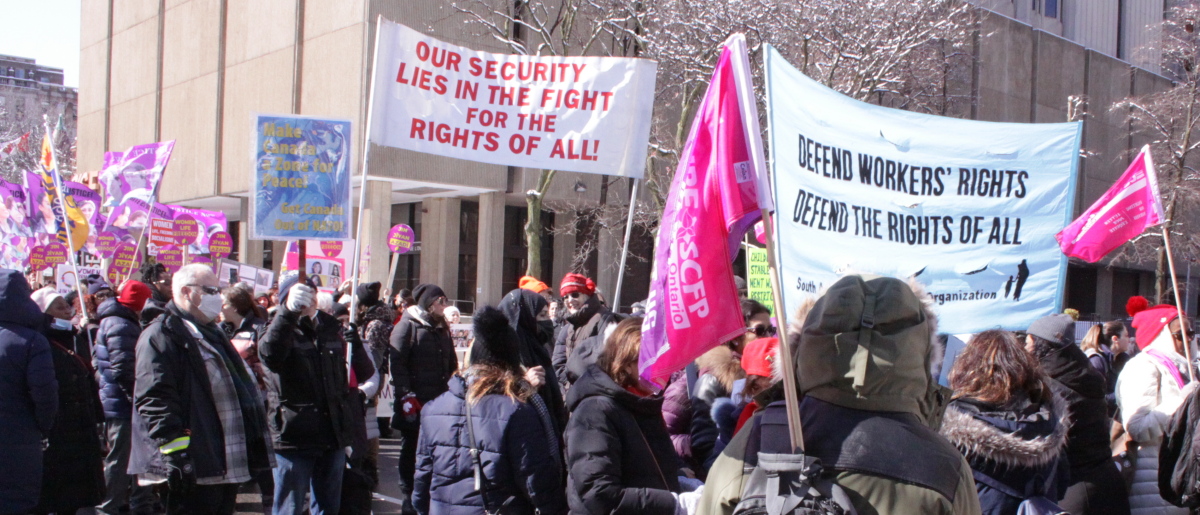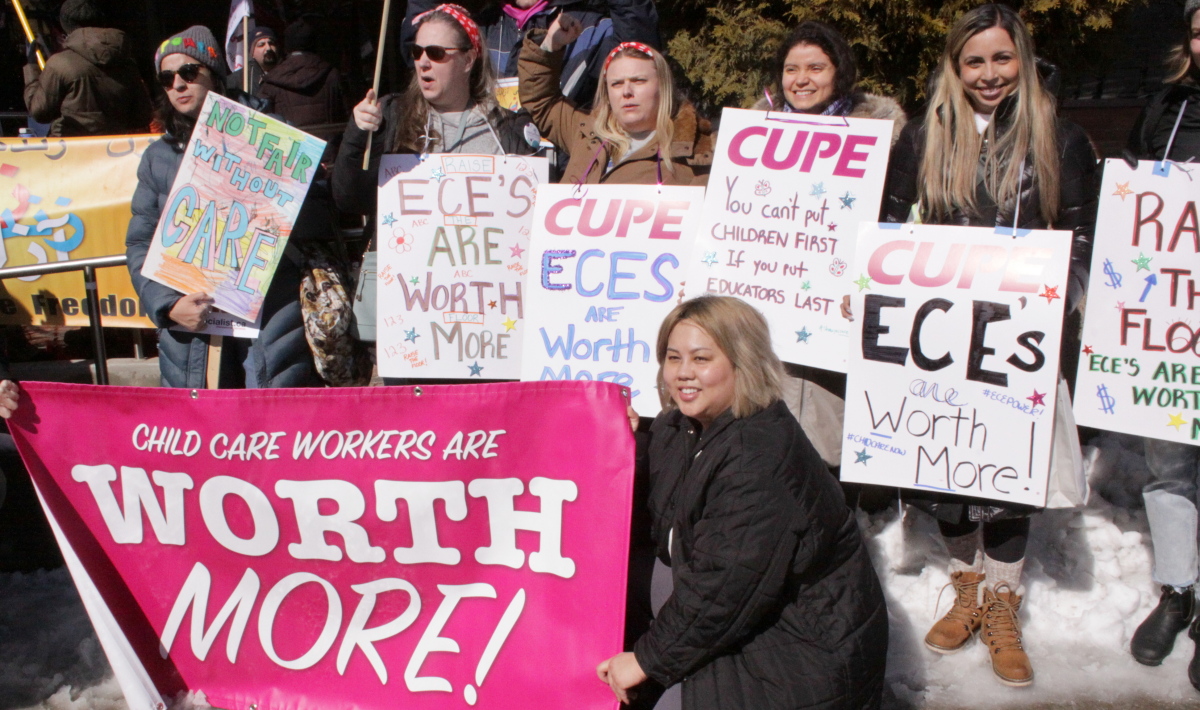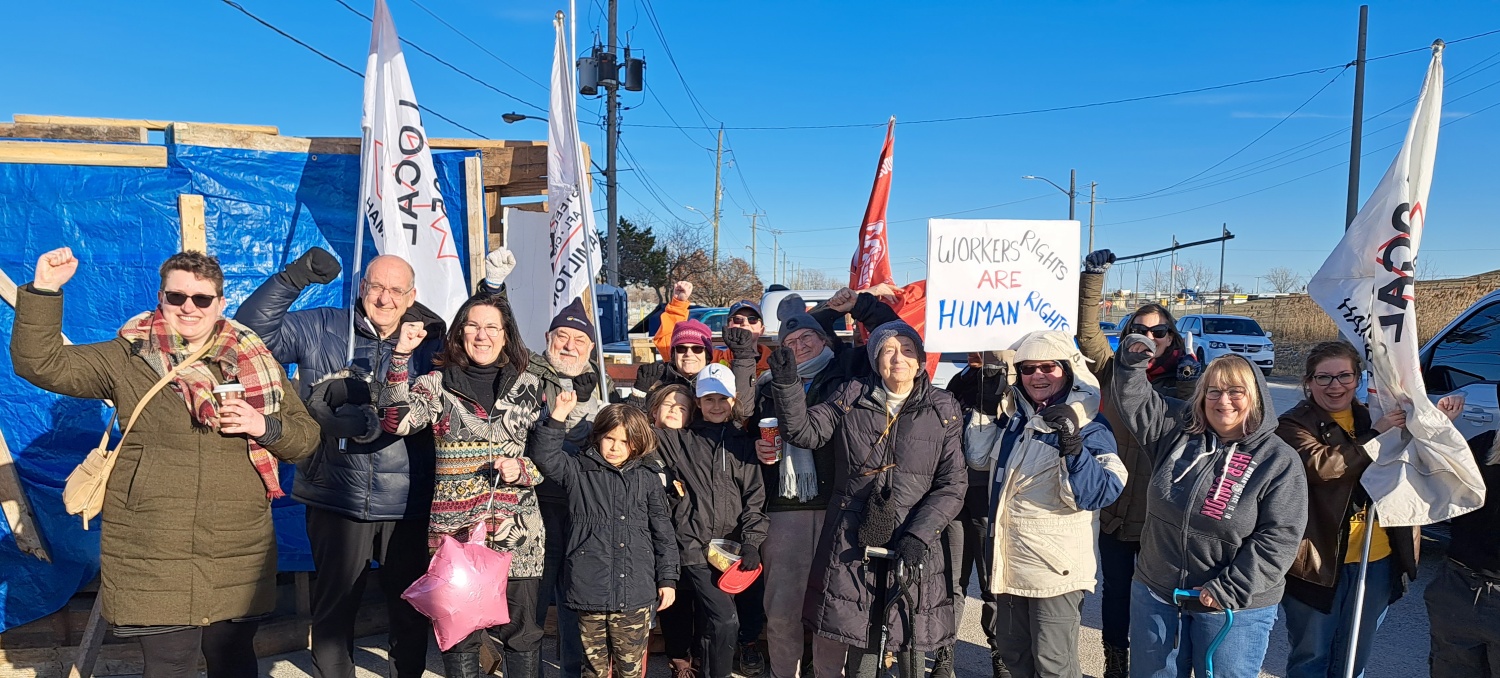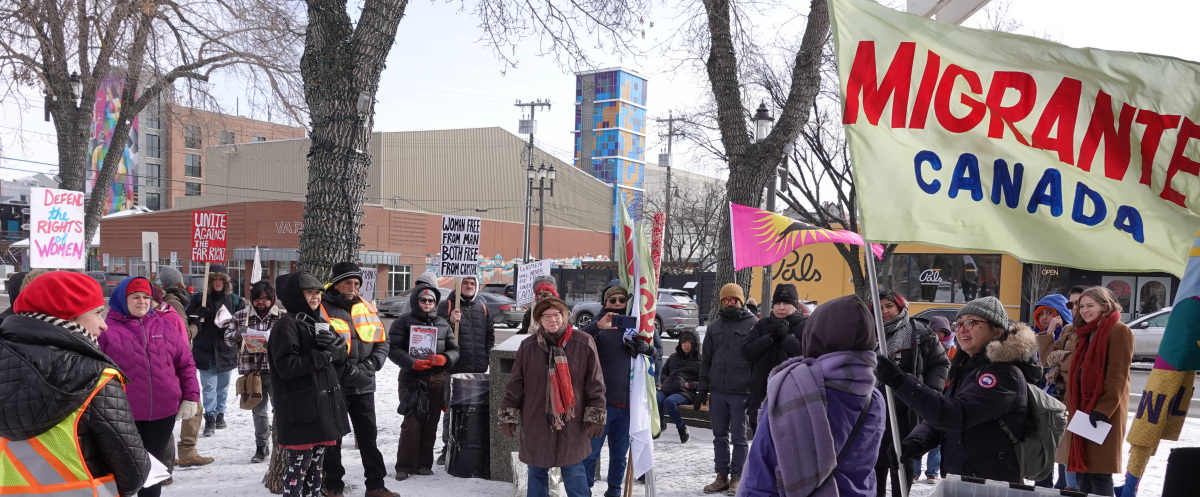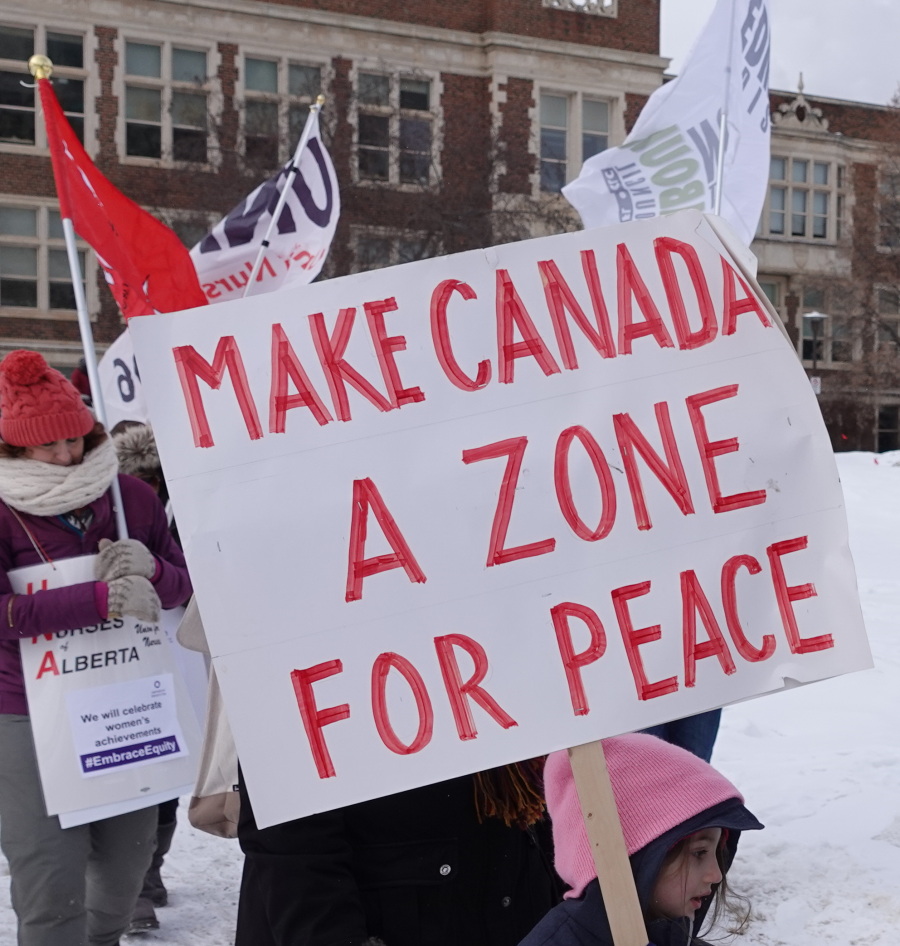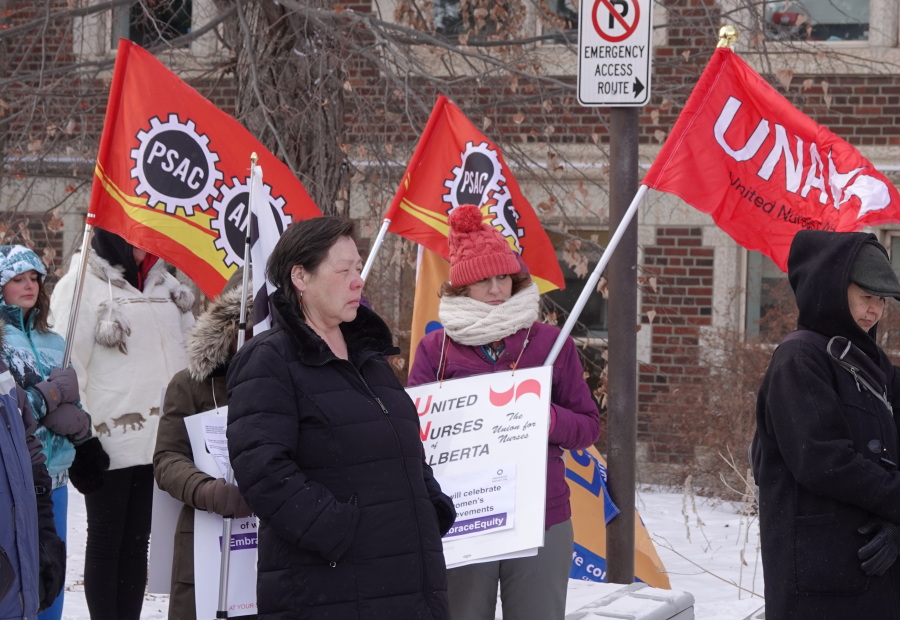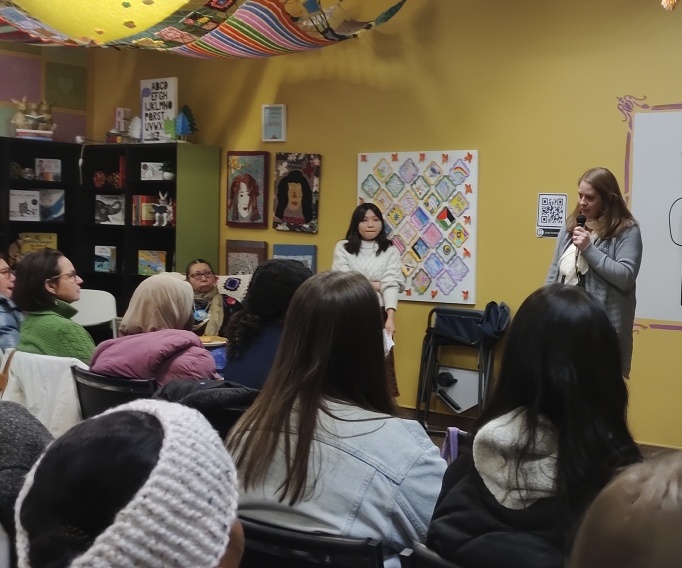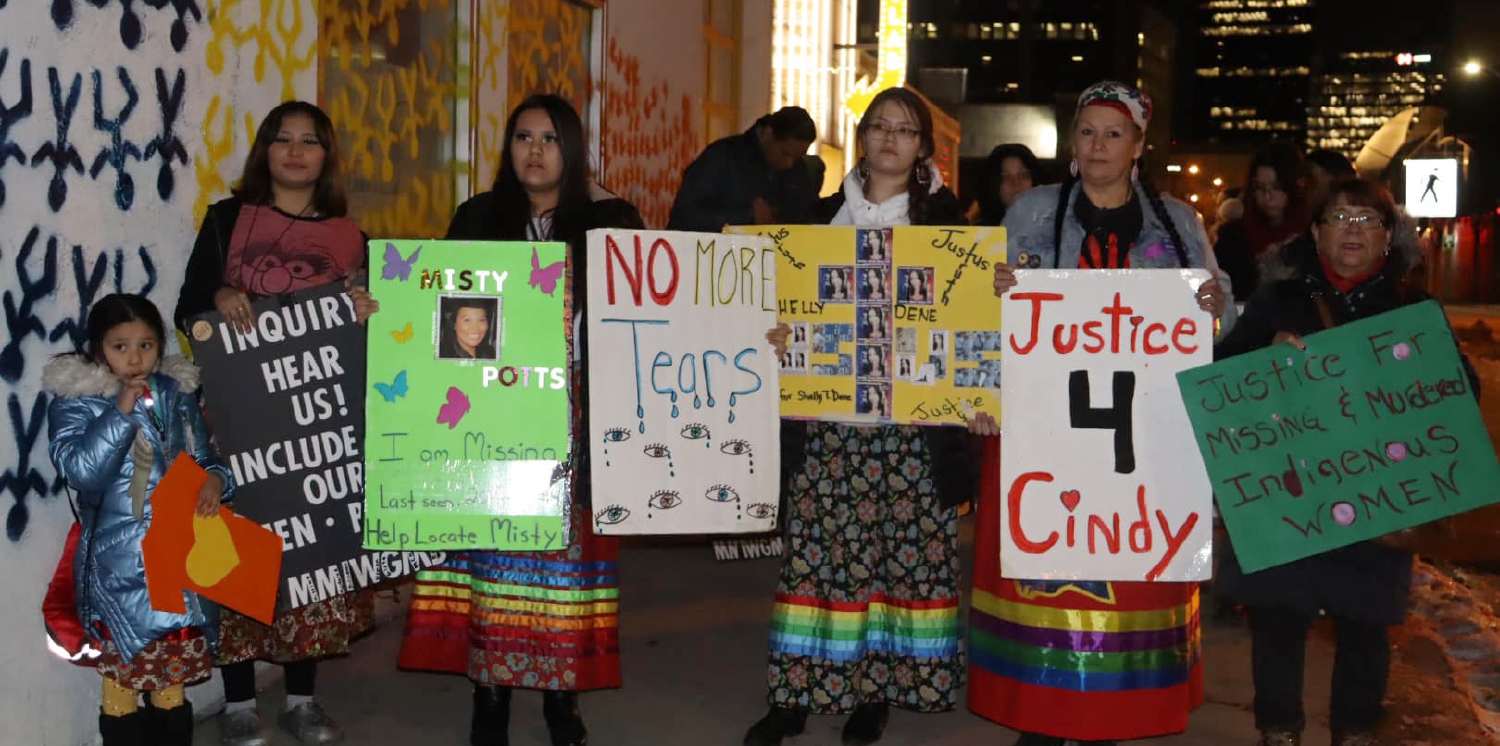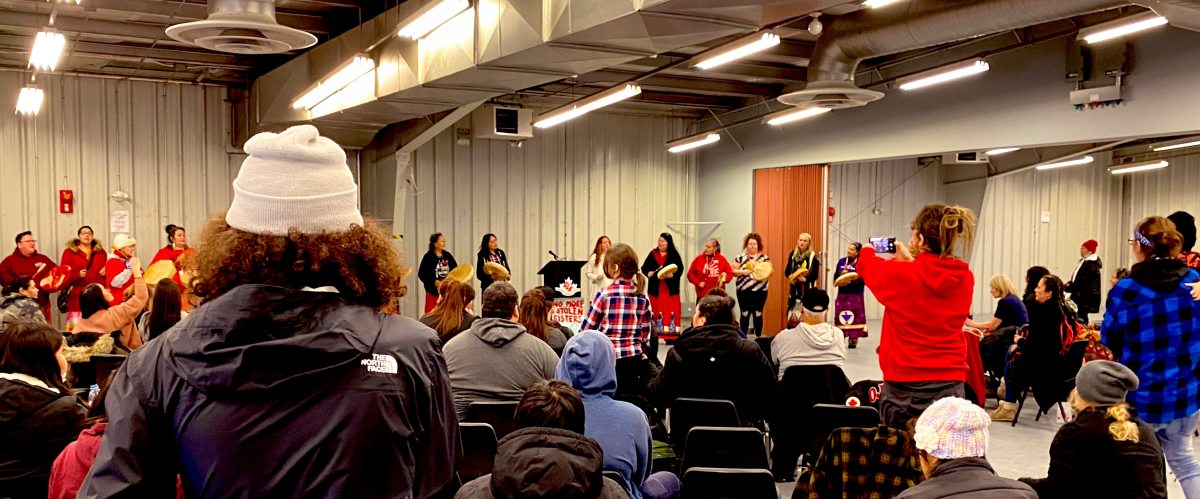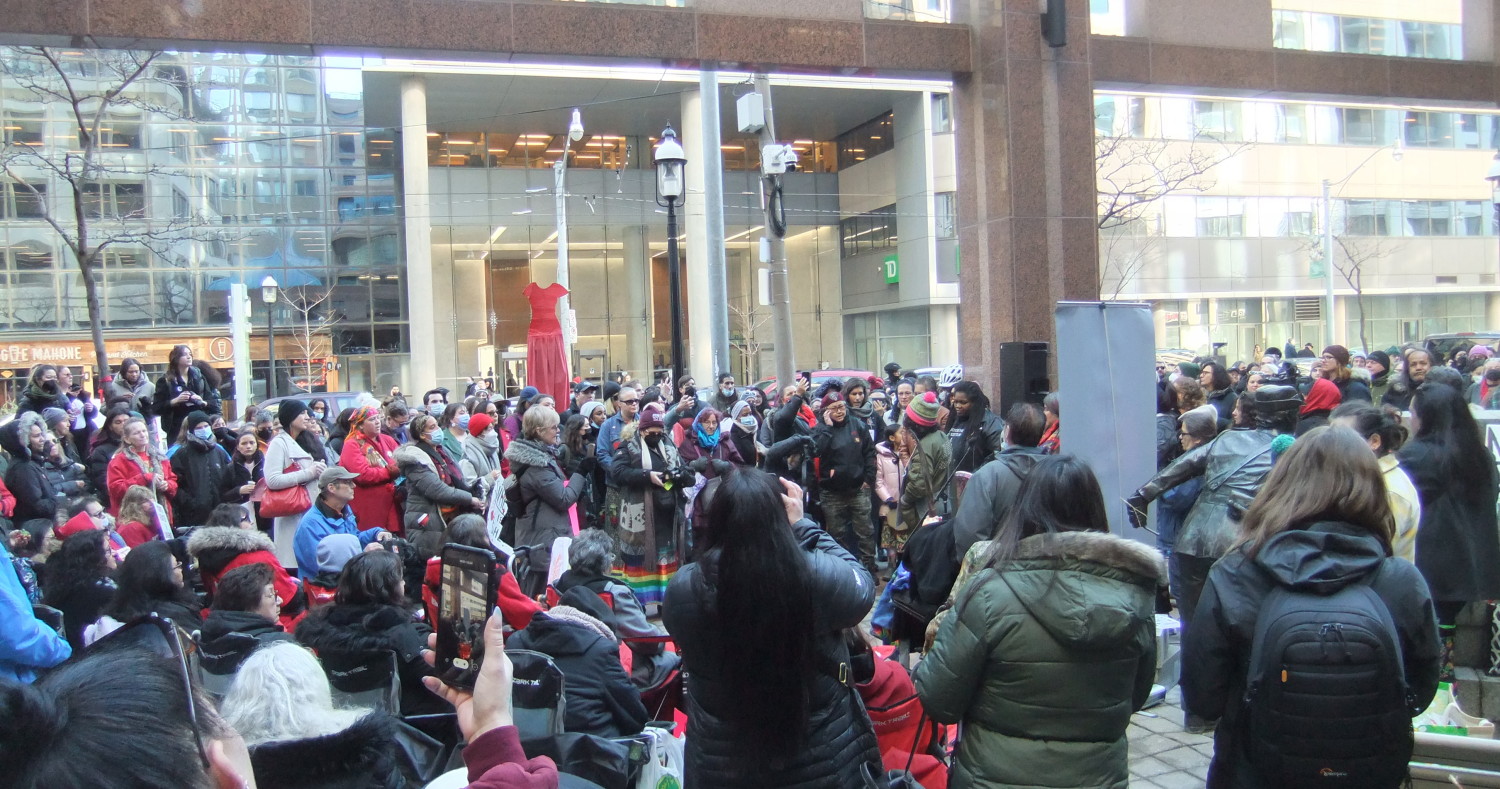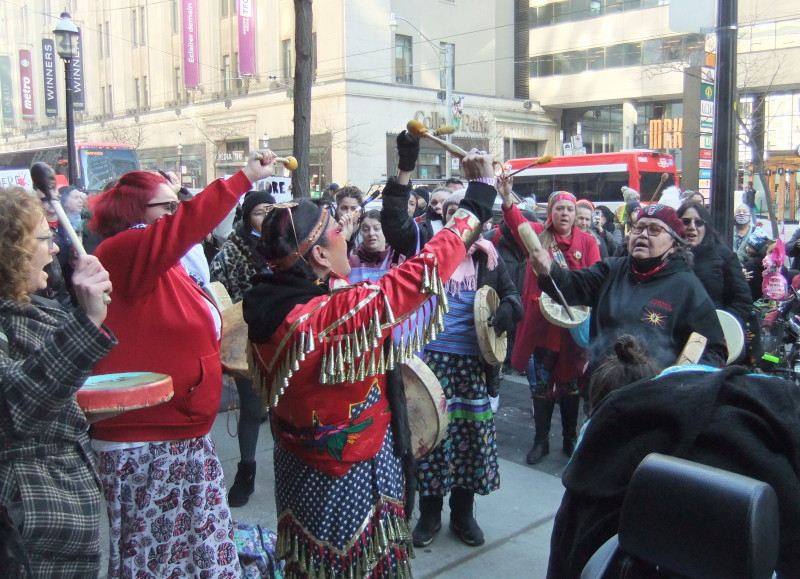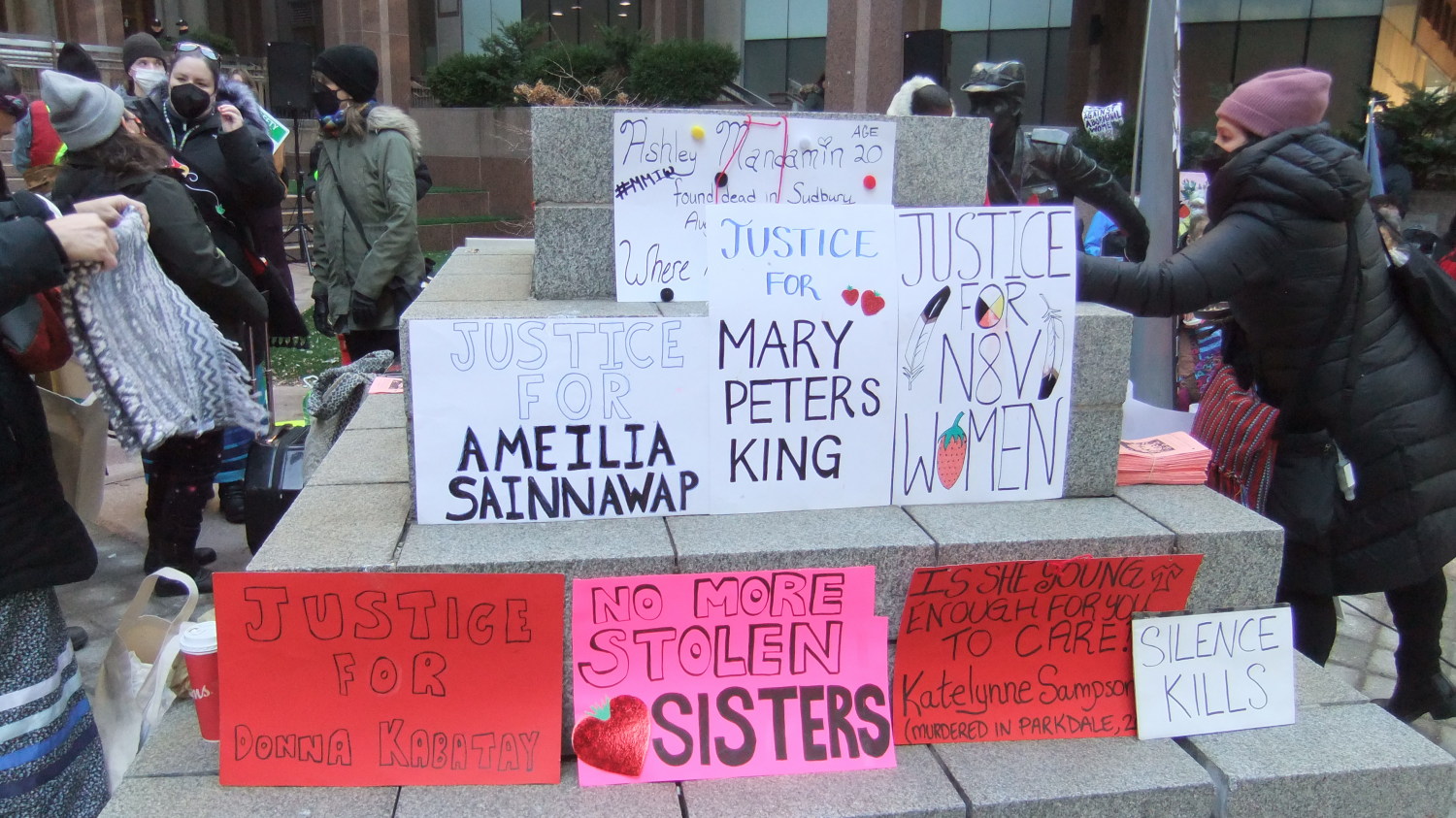No. 3
March 2023
International Women's Day 2023
• Women Lead in the Fight for Rights and Empowerment
• Affirmation of Right to Participate in Decision-Making
• Urgent Need for Democratic Renewal
• Canada's So-Called Feminist Foreign Policy
• Working Women Speak About Matters that Concern Them
• International Women's Day Celebrated
Across
the Country
•
Marches Honour Missing and Murdered
Indigenous
Women and Girls
International Women's Day 2023
Women Lead in the Fight for
Rights
and Empowerment
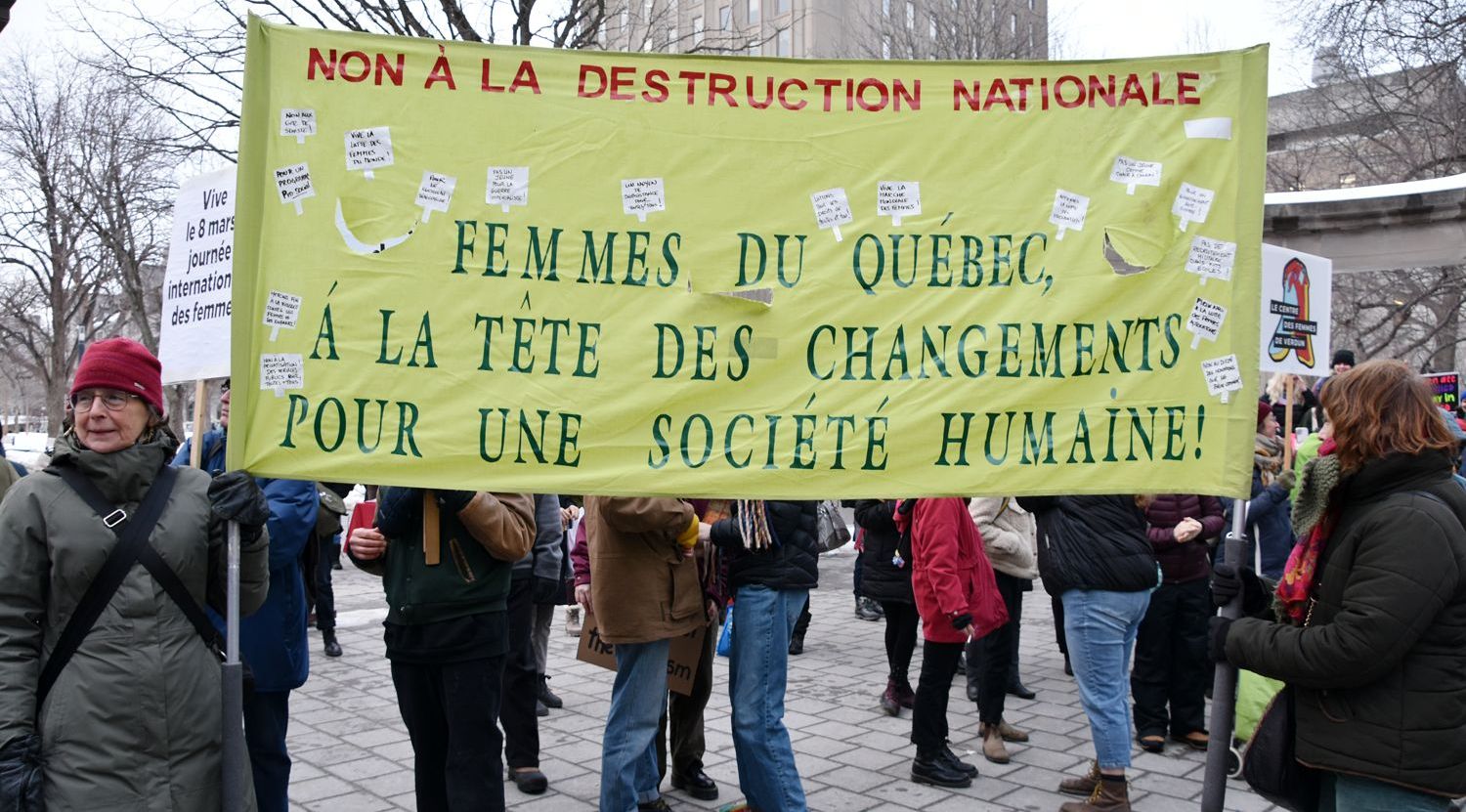
International Women's Day march in
Montreal, March 8, 2023.
Anna Di Carlo is the National Leader of the Marxist-Leninist Party of Canada.
On the occasion of International Women's Day 2023, through their rallies, demonstrations, meetings and interviews, women across the country have spoken out about the matters which concern them. They raised their demands for a society that is fit for humans and showed that we achieve successes when we fight together. We rejoice in these achievements of women who are taking centre stage, standing in the van of the fight for the rights of all. Congratulations to everyone for their contributions, their courage, their persistence and successes.
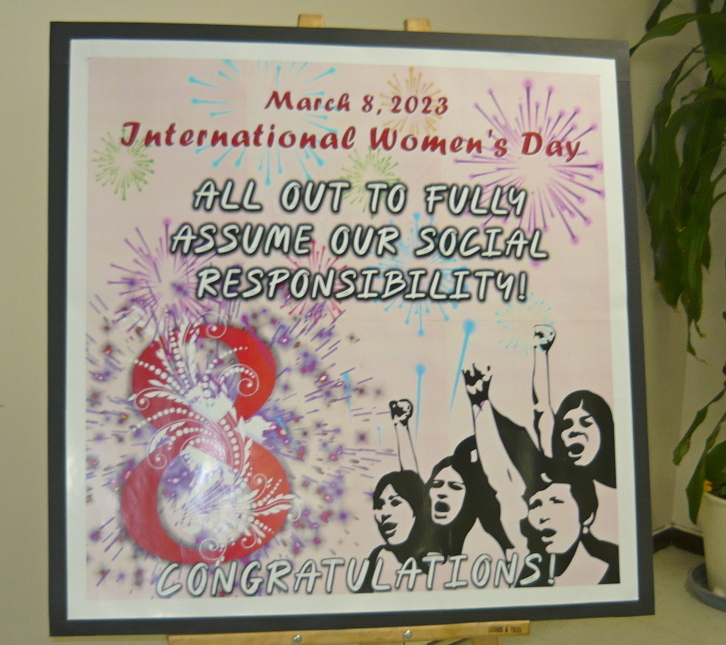
Many examples can be given, such as the automatic attribution of identity decided by others to anyone who speaks, or calling those who question government mandates "right-wing" and the like. So too are people faced with accusations of being reactionary if they are not sufficiently attuned to what is culturally appropriate while governments make crimes against the people legal. We end up with a dismally low level of political response to the anti-social offensive and political assault on the rights of all and with a climate of apparent indifference to what is taking place nationally and internationally.
All of it is disinformation to disengage us from participating together to work out what's what, how matters pose themselves, what is pertinent and what is not and what response favours our interests. An example of how official confusion-making and fearmongering are created is the campaign which seems to be engineered by what are called the intelligence agencies regarding what they call "foreign interference" by China into Canada's electoral and political process. This is done at a time all across the country people are very dissatisfied with how the electoral system brings people called representatives to office who do not in fact represent them. Majority governments are created with a minority of voters who cast ballots for them and with at least a quarter or a third of voters abstaining for lack of candidates who represent their views, claims and wishes. A significant point is why intelligence agencies operate through the media to "leak" stories? Who is pulling what strings that governance has gone so far off the rails and in the name of press freedom, democracy and human rights, Canadians are held hostage to all these practices which sow anarchy and violence?
Not only will declaring China a "hostile state" not sort out any problem of the Canadian, U.S. or European economies but the more the U.S. arms Taiwan and Canada contributes by sending warships to the Taiwan Strait, it will not serve to sort out problems without resorting to the use of violence. This month we are commemorating the 20th anniversary of the U.S. war against Iraq and the 12th anniversary of the U.S.-led destruction of Libya in which Canada played an infamous role. At that time the U.S. raised hysteria against those professing Islam or who were of Arab descent or wore burqas or hijabs and Canada appeased the U.S. and followed suit.
To
this day Canada denies responsibility for islamaphobic attacks
carried
out officially by the state against Canadians, as well as by
deranged
or politically motivated reactionary individuals and groups. So
too
today, it denies any responsibility for the hostile climate it
is
creating against Canadian citizens and residents of Chinese
origin. We
have spoken to many across the country who favour friendly
diplomatic
relations between China and Canada and oppose the use of force
in
sorting out differences between countries. They oppose the
state-criminalization of nationality, such as the refusal to
permit any
cultural performance or exchange if it is of Russian origin, or
now the
persecution of people of Chinese origin. Women are in the
forefront of
opposition to Canadians being marginalized, defamed and
slandered and
even criminalized for taking stands according to their
conscience.
They oppose attempts to disorient them, silence them, intimidate them so that they cannot speak freely and work collectively to provide serious problems with solutions which favour them and the polity as a whole. This is a major concern which women have spoken up about on the occasion of International Women's Day.
More than ever, the situation demands that we create forums where we can come together to exchange experiences, to raise our concerns in an atmosphere where we can speak freely without fear or recriminations for expressing what's on our minds and without taking sides pro-this or con-that, without fear of whether or not we are saying the "right thing." How can we stop being undermined by prejudices and notions that obstruct our thinking and obstruct looking at facts and drawing warranted conclusions if we cannot speak freely? When the intention is to sort things out in a manner that favours us, speaking freely will realize that intention. When the intention is to impose beliefs and foregone conclusions, the result is not the unity of the people, but their division and disaffection.
We are pleased to see that such forums are being created across the country where a principle of participation is that what is said there stays there and the aim of discussion and exchanges is to strengthen the interventions of women to find solutions, assist one another to organize, understand better what is at stake and how women can assist one another to achieve success.
This year for International Women's Day, the Trudeau government set the theme "Every Woman Counts." It is used to negate what women themselves are bringing into being when they speak in their own name and make the claims which they must on society. How does the Trudeau government intend to count every woman and declare that it speaks in their name? Women are not numbers on a sheet of paper which contains the speaking points of fraudulent politicians. Far from listening to the women fighting on the front lines in every sphere of life in Canada and internationally and recognizing their collective strength, the government and its agencies spout nonsense such as the cruel message Status of Women delivers to the youth when it says "Your dream is within reach." Whose dream would that be? The efforts of what the government calls the best and the brightest which will be given positions in the armed forces and governments to enforce the values which Canadians have not adopted?
Life itself reveals the fate reserved at the hands of the governments for the missing Indigenous girls or for young people forced to fend for themselves, in competition with everyone else. They are told that if they make the right choices and behave well, "they can make it." If they do not "make it," then they can live with the guilt that they did not try hard enough and can only blame themselves for the absence of a bright future.
According to the ruling elite, the Canadian government is in the forefront of fighting for women's rights. The proof is supposed to be the fact that women are in key cabinet positions starting with the Deputy Prime Minister and Minister of Finance Chrystia Freeland, Foreign Affairs Minister Mélanie Joly, and Defence Minister Anita Anand. We are to presume they illustrate what the government considers a successful woman. These women are carrying out Canada's neo-liberal anti-social offensive which violates the rights of all. In the name of human rights and a so-called rules-based system, they promote nation-wrecking and are unabashed in pushing the integration of the Canadian economy into U.S. war production and calling Canadian territory "NATO territory" in lock-step with U.S. warmongers striving for world hegemony.
The women of this country want a system where the rulers do not stand above the people and block the people from taking the decisions which affect their lives.
On this occasion we celebrate together our successes. We define for ourselves what constitutes a success based on the fact that we realize a plan we ourselves adopt and implement. We fight against all forms of discrimination and injustice, and for the rights of all.
In 2023, let us come together to create forms which assist one another in our organizing efforts, to share experiences in organizing and work out together how to resolve the crises in which society is mired in a manner which favours the working people, not the beneficiaries of the decaying system of power and privilege.
Affirmation of Right to
Participate in
Decision-Making
On the occasion of International Women's Day 2023 women all over the world have taken their place at the head of all the struggles being waged for a world in which human beings can flourish and be in command of the affairs of their nations. Internationally women are in the forefront of the fight to dismantle NATO, end the conflict in Ukraine through negotiations, and uphold the principles of equality of nations and the peaceful resolution of conflicts between nations.
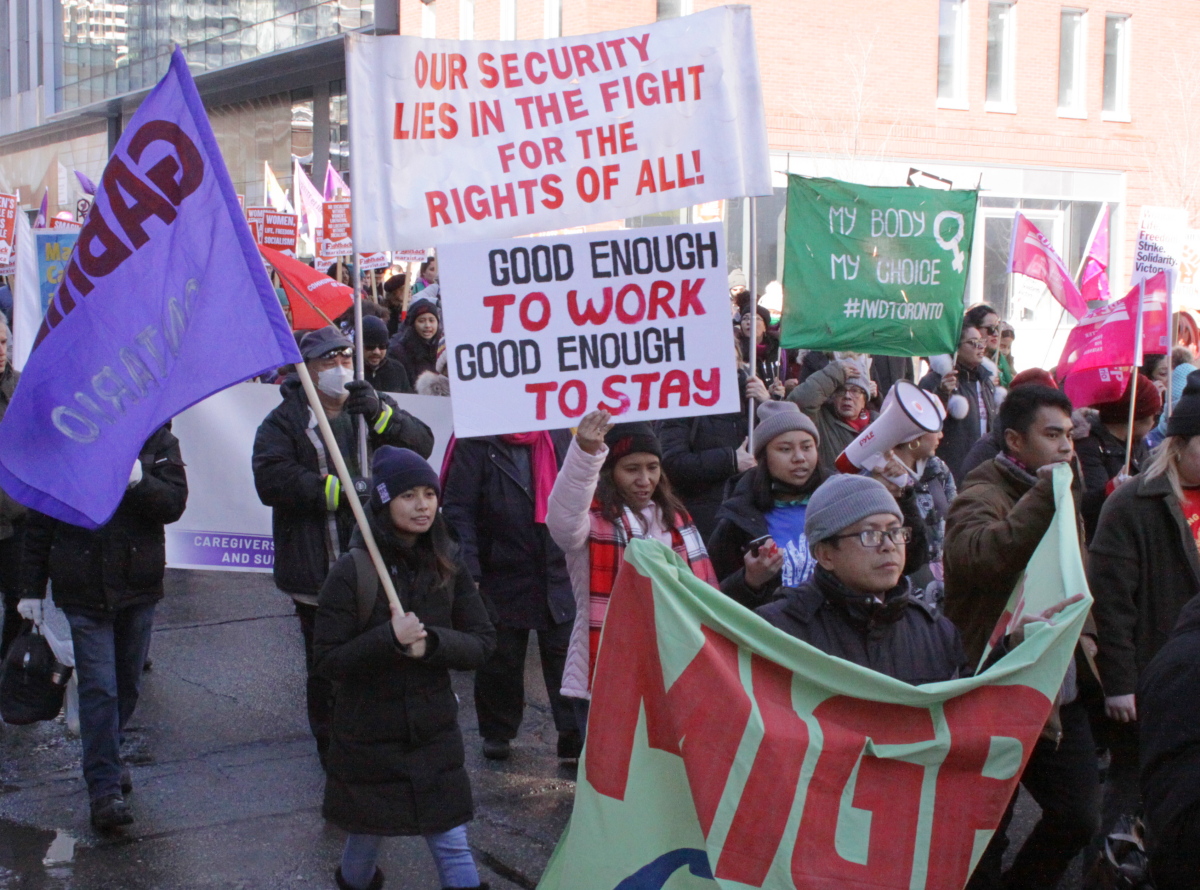
A problem that we are facing is that our outmoded political system denies us the right to participate in decision-making so that we can collectively bring about the changes in the economy required so that the needs of the people are at the centre of planning, not narrow private interests. The cartel parties speak on behalf of the narrow private interests who have seized control of the federal and provincial governments. They tell the people, including women fighting for their rights, that we should count on them for solutions. We are told that we should accept a political system in which only a handful of people make decisions that affect everyone, a system that blocks us from solving any problems.
We know what needs to be done. On every front, Canadian women are standing up to the brutality of the anti-social offensive that is wrecking society and forcing everyone to fend for themselves. We do not accept that health care workers, education workers and others should work in untenable conditions. Nor do we accept that governments abdicate their responsibility to invest in the services that people need while attacking the workers who have given their all during the pandemic and continue to do so. We are putting forward human-centred solutions and fighting for them.
Militant women at the Toronto rally made it clear that we are taking our destiny into our own hands and consider it our right and duty to change the society into one that upholds the rights of all.
Urgent Need for Democratic Renewal
On this International Women's Day, I think the most urgent problem facing women is the need for the renewal of the democracy, and for people's empowerment. The battles women are waging and leading bring to the fore what kind of equality women are fighting for. The modern demand for equality arises from our common quality of being human, on the basis of which we make our claims for equal political and social status, and as women for all that we need as the reproducers of life. That is that all members of the society have equal rights and responsibilities to participate in decision-making and to implement those decisions.
The existing "democratic institutions" divide society into those who rule and stand above the people, and those who are ruled. We fight not only against all forms of discrimination, but for the equality of membership of all in society as the decision-makers. Women are not fighting to be ruled "equally" much less to join or be accommodated by those who rule on behalf of the global financial oligarchy.
Consider the questions of war and peace. The demands for political power and for peace are the lasting legacy of the decision to establish International Women's Day by the Communist, socialist, and working women 113 years ago. Today, women are in the front ranks of the work to make Canada a zone for peace.
Following World War II, the demand of the people for a world united for peace gave rise to the Charter of the United Nations, and its principles of the right of every country and people to decide their own path, the sovereign equality of all countries, the rule of international law, and the peaceful resolution of disputes between nations.
 The people's
right to deliberate and decide on all matters of war and peace
is of
the greatest importance today in order to uphold these
principles, in
the face of Canada's integration into the U.S. war machine and
economy.
The U.S. imperialists now refer to Canada and others as "NATO
territory" by which they mean subservient to its war aims and
drive to
maintain U.S. supremacy at any cost, in lock-step with the
U.S./NATO
proxy war with the aim of crushing Russia, and dead set against
efforts
to reach a peaceful solution. Women Cabinet Ministers openly
shout the
slogans of the Ukrainian Nazi collaborators, the Banderites,
while
Canada trains today's neo-Nazis in Ukraine. One can see that the
aim of
the Trudeau government's "feminist foreign policy" is to recruit
women
both to directly participate in the armed forces and the NATO
organization, and to support its war aims.
The people's
right to deliberate and decide on all matters of war and peace
is of
the greatest importance today in order to uphold these
principles, in
the face of Canada's integration into the U.S. war machine and
economy.
The U.S. imperialists now refer to Canada and others as "NATO
territory" by which they mean subservient to its war aims and
drive to
maintain U.S. supremacy at any cost, in lock-step with the
U.S./NATO
proxy war with the aim of crushing Russia, and dead set against
efforts
to reach a peaceful solution. Women Cabinet Ministers openly
shout the
slogans of the Ukrainian Nazi collaborators, the Banderites,
while
Canada trains today's neo-Nazis in Ukraine. One can see that the
aim of
the Trudeau government's "feminist foreign policy" is to recruit
women
both to directly participate in the armed forces and the NATO
organization, and to support its war aims.
It has never been more important to deliberate and discuss what is taking place, and to take our stand for those principles which represent the striving of the peoples of the world. Canada's membership in NATO and NORAD has never been approved by Canadians, yet even to raise one's voice that Canada should get out of NATO and NORAD is to be open to accusations of being a threat to national security. It must not pass!
How can the most destructive powers humanity has ever known be permitted to be under the control of one country or one man or even one woman for that matter. Make Canada a Zone for Peace! Canada Out of NATO and NORAD!
Women know that whatever accomplishments, whatever successes we women have collectively achieved are our own doing. They have not been given to us, because our rights belong to us, they cannot be given and taken away. This anti-social offensive is unsustainable, the workers, women and youth are saying with their words and deeds. The need for the people to exercise the decision-making power is palpable, it is in the air, it is everywhere.
In strengthening our sense of responsibility to each other, by taking up our social responsibility to society, we are guided not by what governments proclaim to be the agenda, but by the needs we define and the claims we make as humans, as women, as workers.
It is in these battles -- the fight for wages and working conditions acceptable to themselves and necessary to provide the services society needs, for an end to violence and discrimination, for reproductive rights, for Status for All, for Mother Earth and climate justice, for Indigenous hereditary and treaty rights, for peace -- that what is needed for human beings to flourish comes into focus. The times are calling for renewal of the political process, to make Canada a Zone for Peace, for a society in which the rights of all are recognized.
Canada's So-Called Feminist Foreign Policy
Jennie-Laure Sully is a community organizer in Montreal and Solidarité Québec-Haïti activist.
This International Women's Day, the concern that comes to my mind is the importance of women's struggle for workers, for the working class in general. March 8 is linked to women workers. It is linked to women who were fighting to have their rights recognized as workers and as women.
There is a kind of drift at the moment. We hear about a feminism that is a kind of neo-liberal feminism. There is not necessarily a link made with working class women, with women in the most precarious situation in our society. There is a tendency to want to depoliticize feminism and even to remove its working-class roots.
Moreover, with all that is happening with the wars, we see that there is an effort to divert feminism while the link between feminism and anti-imperialism is important.
I note that feminists in the South, in Latin America or in Venezuela or in Haiti, put forward a feminism that is very anti-imperialist. For example, feminists in these countries are increasingly asserting their feminism outside of Western NGOs (non-governmental organizations). There are big NGOs that are connected to the United States or Canada, that are connected to development assistance, that come in and say "we're coming here to bring you feminism." These women don't need lessons in feminism from the United States or Canada.
We are seeing more and more a rejection of a certain feminism, like Justin Trudeau calling himself a feminist, which is a real joke to many feminists in the Caribbean and Latin America. Prime Minister Trudeau presents his foreign policy as feminist and often this is done through feminist NGOs that talk about a kind of "soft power."
Canada and other neo-liberal powers try to use NGOs to have more influence in the South. They come up with programs, where they tell feminist groups that they will give grants to their groups but the groups have to accept, for example in Haiti, GMO seeds (genetically modified organisms). They tell them that they have to accept the seed donations they send them, they have to do things a certain way. There is the imposition of a narrative, an ideology, but through subsidies supposedly in support of women. The United States does the same thing.
It may be tempting to take that money, but then they have an influence on the groups and it depoliticizes the groups. They also do this with students. They have tried it in Venezuela, in Cuba. They try to bribe the popular movements. They try to depoliticize the feminist movement and make it a neo-liberal feminism that is favourable to their foreign policy, to the North American western outlook that does not allow local feminism to develop with its own ways, its own traditions.
There are groups of land defenders who have a respect for the land in Latin America and the Caribbean, and there are ecology groups financed by big NGOs linked to big governments that go there to teach them how to do ecology! This is an attempt to impose cultural imperialism.
Feminism must be anti-imperialist and we must be careful as feminists that our struggles are not instrumentalized and hijacked by these neo-liberal powers which are also warmongering powers. Sometimes they justify war by saying that they want to protect women. In Afghanistan, they did it, and they are trying to do it all over the Middle East. It is supposedly for the good of women that they do this. There are all kinds of lies around this.
Workers must also remember that there is too a struggle against patriarchy. Those in power are generally men who try to control lives, including the lives of women, in order to have more control over the land and resources. We see this when we look at what is happening to Indigenous women with the projects of these big land grabbers in the far north and how it is accompanied by sexual violence. We see that their extractivist campaigns in the countries of the South are also accompanied by sexual violence. The struggle against these exploiters necessarily includes the struggle against patriarchy.
(Translated from the original French by Workers' Forum.)
Working Women Speak About
Matters
that Concern Them

IWD 2023 greetings from
women in FTQ Construction.
On the occasion of International Women's Day, the Workers' Centre of CPC(M-L) interviewed working women from across the country who are on the front lines of the fight for a society fit for human beings that guarantees the rights of women and the rights of all. Excerpts of their interviews are published below.
For Living and Working Conditions that Ensure a Life of Dignity for All Women
Marie-Sophie Plante, a carpenter-joiner, in Local 9, FTQ-Construction, said:
"I know that it's not only women who face discrimination; men also experience it. However, we experience discrimination as women, and one thing in particular in construction that affects us is that sometimes women don't get hired by a company because they're women. It has happened to me. It's not hidden, it's very clear that this is the reason. And we're talking here about large companies that receive public contracts and do not hire women. With regard to my possibilities of finding work or keeping it, since I've been working, I've been asked more than once, 'Do you want to have children soon?'
"As well, in construction, there is a big culture of silence around this; it's not spoken about. In a sector such as a government ministry or for a municipal job, if a woman is turned down on that basis, it could make the news. But construction is so small that everyone knows each other. Companies get around a lot, all the contractors know one another. If we talk about it, for sure the next day I won't be able to find a job. We'll be barred from a lot of places because we dared to talk about it.
"A big concern, not just for us in construction but for everyone, is work-family balance. Many workers lose their jobs because of problems related to this.
"We see it in the statistics that women earn less because of this. They have to leave work early to take care of the children, miss days because their child is sick. The worker ends up with 25 hours in her week instead of 40. Rather than being told that nothing can be done, that the hours are lost and that's it, we need a better retention of hours to allow women to make up for the hours they've lost."
On the subject of the living conditions of women working in the mining sector, Nadine Joncas, a prevention representative with USW Local 5778 at ArcelorMittal's Fermont iron mine in northern Quebec, told us:
"The method of employment commonly known as 'fly-in fly-out' is a major concern. [This is the way of organizing work where companies fly workers in and out of production sites instead of relocating them to the region. Workers alternate weeks of work on the sites and periods of rest at home -- Workers' Forum note.] This method of work does not facilitate the inclusion of women. For a woman's situation, a mother's situation, fly-in fly-out is not an ideal job for raising and caring for a child.
"Certainly there are now many more women in the non-traditional trades. In our local, we have eight per cent women, it hasn't changed much, but women are more accepted in the trades of welder, mechanic, etc. Women are accepted and they are good at what they do. That opens a door, but the work schedules don't make it easy to include women, to have more women. I'm talking about twelve hour shifts, night shifts, no daycare. This does not help. We're still at eight per cent women and we've been at eight per cent for years. We have to innovate to meet these new challenges.
"Work-family balance is becoming more and more important in the values that drive young people. The young people I see put a lot of value on involving themselves in family life, with their children. But today we are back to Les filles de Caleb, when the guys would leave home for months to go where the work is. We remember the character of Ovila in this television series who leaves to do logging in the winter and returns in the spring, and the mother is left alone with the children."

Telus workers "practice"
picket in Calgary, February 26, 2023.
Workers from Telus told us about the fight that workers at this telecom giant have been waging against concessionary demands in negotiations which recently resulted in a tentative agreement that was ratified on March 17.
Jennifer Turner, a shop steward and member of the Executive Board of USW Local 1944, said:
"My concern is that TELUS is so aggressive in their offshoring. We want job security in the future. And that is a really big one for us. I work ACES, an area that looks after dealers and door-to-door people. When I started it was pretty much all onshore, and there was only one team offshore. Now there are five teams offshore working in the Philippines, and only three teams onshore. Also not having any pay increases for so long is a problem. Inflation is so high and you know, as women, we need to take care of our families. The company is constantly raising their prices for their products but not even offering us any raise for all of 2022. Those are my biggest concerns and also the fact that they are going after our benefits, giving us less sick days, so that's definitely a concern."
Another shop steward said:
"The company puts call centres in Manilla, India, Guatemala, and they pay people dollars a day. That is not helping the economy here, for anyone, and I feel like it will be hard for workers in these countries to build their labour rights as big companies like TELUS are going there to exploit them. I think it is hurting them more than helping them.
"With regard to the electronic monitoring, it is not as intense in the department where I work as in other departments, but as a Shop Steward I have gone to other departments and have been just shocked that they are asking people things like 'what were you doing for the seven seconds that your mouse was idling?'"
Kathleen Mpulubusi, a postal worker and union activist in Alberta, spoke about conditions at the post office:
"In Edmonton, particularly at the Canada Post plant, there are ongoing issues of harassment from supervisors, and for the women it is compounded by sexual harassment.
"This week, 40 workers on the evening shift in the parcel section were suspended for a week without pay. The workers requested a brief meeting with the shift manager to present a petition with their health and safety and staffing concerns. This is their right under the collective agreement, to present a complaint without fear of retribution or intimidation or being impeded. So there was a two-and-a-half hour 'standoff ' before the manager finally met with the workers, but in the meantime he called security to try and force the workers back to work. He called the police, he even threatened to have our local president arrested for delaying the mail, which is technically a federal offense. The director of Edmonton operations and the plant manager showed up, as well as the head of Canada Post security. When our president, who the workers had asked to be present, left the plant, there were three cop cars lined up outside. So they suspended all the workers at once for a full week, and then tried to call in casuals, many of whom were 'unavailable.' According to Canada Post, that two-and-a-half hours resulted in the delay of 14,000 parcels. So this is what life is like in the plant."
Karine Ouellet Moreau, president of the Union of Nurses, Licensed Practical Nurses and Inhalotherapists of Northeastern Quebec said:
"There is a lot of mandatory on-call, which needs to be reviewed. We need to review the remuneration parameters. For eight hours of on-call, nurses who are in home care are paid for one hour. The government has imposed mandatory on-call. They may or may not be called in, but they are paid for one hour only. To be on call for eight hours, they require someone to support them. If they have to leave the house, they need support for the children. I live in Forestville in the Upper North Shore, and the girls who are in home care have on-call duties.
"There is the problem of mandatory overtime. The nurses come in at a certain time, but they don't know what time they're going to get out. They need a family resource or other personal resource after the daycare closes."
Here is an excerpt of our talk with Tina Laforce, Chapter Chair, Local 47, Chapter 8, Alberta Union of Public Employees:
"I represent workers at the for-profit company CBI. Home care is a vital part of our society for the seniors, a lot of people prefer, or it's better for them, to stay at home and have someone come in and help them instead of having to go into a facility.
"One of the issues that we're dealing with is the wages, both the hourly pay and how home care workers get paid. For example, they are paid like 30 minutes a visit, and that is supposed to include the travel time. But it actually takes 30 minutes to do the care with the client, so the workers are not getting paid for their travel time. Plus you only get $1.40 per visit -- not including the first and last visit of the day -- for fuel and use of your own vehicle.
"Everyone is considered casual, and CBI is not obligated to provide a full eight hours of work. Some days they might work six or nine hours, another day it could be two hours, so it's not consistent. But the company expects them to be available. Some people work two or three jobs to try to make ends meet. How can they pay their bills? How can they keep up with the economy, prices are going up, groceries and fuel and everything is just going up. And they're having a hard time just making ends meet. So it's really frustrating and stressful for the workers."
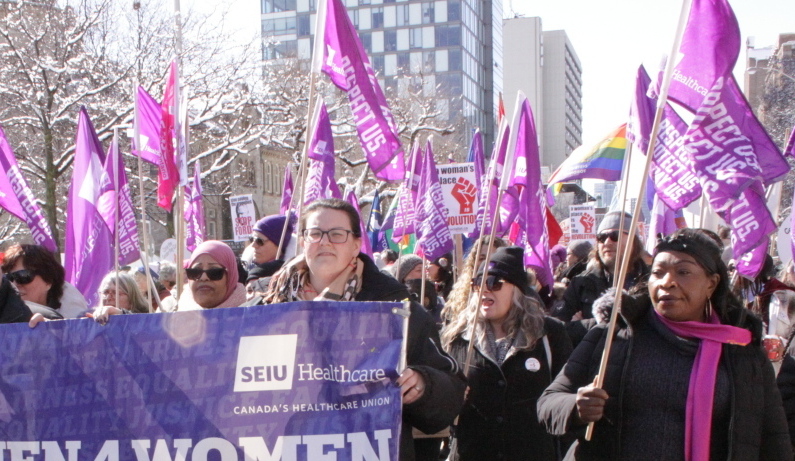
Health care workers participate in IWD
march in Toronto, March 4, 2023.
Sandra Mullen, president of the Nova Scotia Government and General Employees Union, had this to say about living and working conditions in her sector:
"A big concern is the precarious work that women have been facing, whether that is the gig economy or sectors where so many employers downsize and contract out, and things like that. The majority of workers that it affects can be women. Part-time work and the work situation that health care folks are in now, being so short staffed, falls mainly on women who make up the majority of the work force. It affects family and home life as well, and puts stress on that. The inflationary cost, all of those things, are affecting single parents, the majority of whom are women. It is recovery, if we can say, from the pandemic, where money was lost, income was lost, therefore contributions to CPP and to pension programs are affected. All of those are going to have such an impact on women.
"There are many workplaces that go through a process of restructuring. Our government has been active in taking people out of the provincial government employment and creating agencies as a way of restructuring. We work very hard at ensuring that nobody loses their jobs but it does impact their employment.
"People are facing a housing crisis all across the country including in our own province of Nova Scotia. These folks are in some of the lowest paying jobs, and there are a lots of jobs out there, but people have to have a place to live. They are bringing in migrant workers and immigrant workers in all sectors and they face a challenge in finding them a place to live."
Montreal secondary school remedial teacher Geneviève Royer, made this comment about conditions in education:
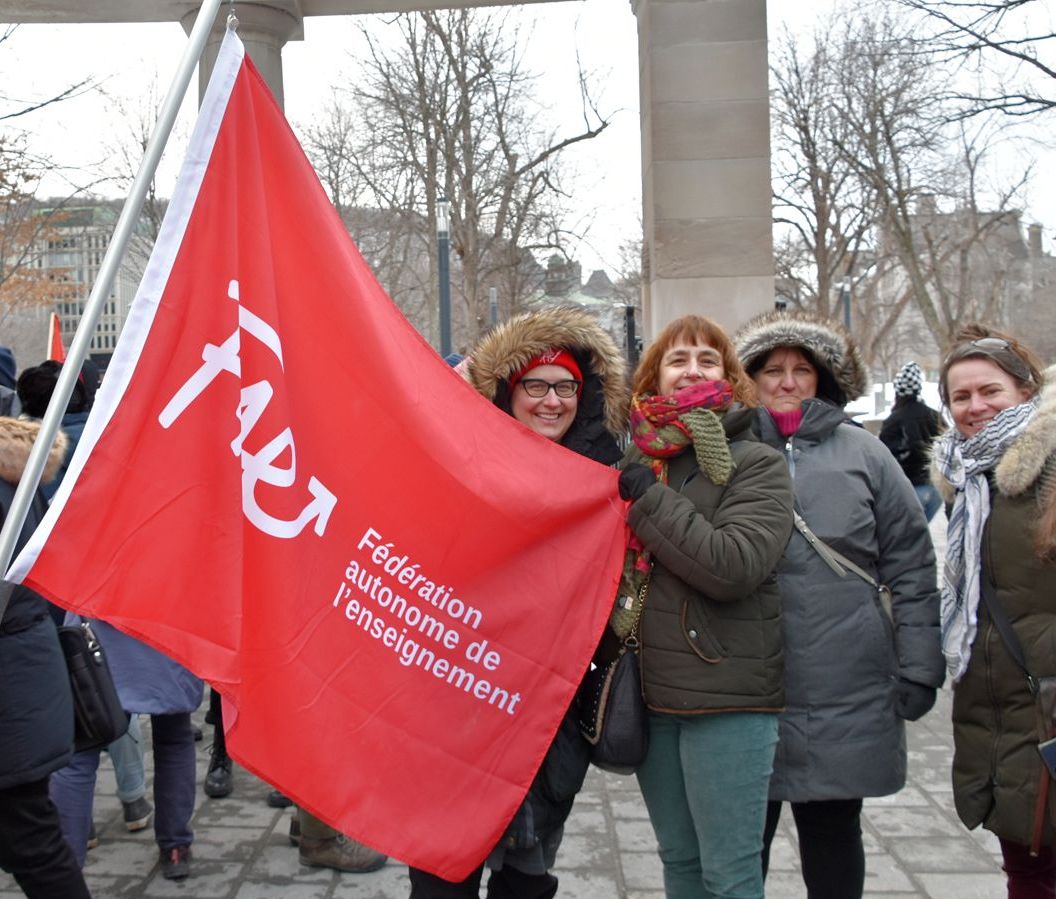 "The education sector is in
crisis. It is an environment that has been extremely weakened,
obviously, by the thirty years of cuts in the public sector, an
environment that is also weakened because the children and
adolescents
and their families with whom we work are also affected by the
anti-social offensive. Our challenges are great. They are as
much about
the type of program and modern pedagogy that Quebec schools of
the 21st
century need, as they are about the types of resources that
should
exist in schools to enable the younger generation to flourish
and take
their place in society.
"The education sector is in
crisis. It is an environment that has been extremely weakened,
obviously, by the thirty years of cuts in the public sector, an
environment that is also weakened because the children and
adolescents
and their families with whom we work are also affected by the
anti-social offensive. Our challenges are great. They are as
much about
the type of program and modern pedagogy that Quebec schools of
the 21st
century need, as they are about the types of resources that
should
exist in schools to enable the younger generation to flourish
and take
their place in society.
"Education workers create immense value for society. Imagine a young person spending eight hours a day in school, being supervised by adults who guide them in their academic, sport and social learning, and feeling that their needs are being met. Definitely, the tension within schools would decrease and what exists as a form of violence experienced in schools could only decrease and this could only have a beneficial effect on the whole society.
"It is well known that providing students with the conditions to affirm their right to an education depends on ensuring proper working conditions for teachers and education workers.
"So why is it that the demands for working conditions that allow us to affirm and create this situation in our schools are never the ones that are legally binding in negotiations? "
Women organizing among migrants, immigrants and refugees also addressed their fight to have their rights recognized in Canada.
The South Asian Women's Rights Organization (SAWRO), an organization of immigrant women in the east end of Toronto, many of whom are precariously employed working for temporary work agencies in both industrial and service sector workplaces, said:
"The health and security of each individual lies in the health and security of all. People whose daily lives are shaped and impacted by compounding systemic barriers need a comprehensive approach to reforms to address the interlinking crisis of poverty, housing, health, and so on. Patchworks of responses and programming to address large-scale issues that only provide temporary relief and band-aid solutions are no longer adequate in meeting the genuine needs of highly-impacted communities.
"The global health crisis and the looming economic recession must lead to sweeping changes in the way policies and programs are decided, in particular the fundamental values that guide these processes. We need comprehensive responses that address the multidimensional impacts faced by highly-impacted communities across Canada. To achieve this, marginalized communities across Canada must mobilize within their communities and alongside each other."
 Skit by SAWRO at Toronto IWD rally
dramatizes the many problems women face and government's lack of
response and concludes women have to together fight to
change
the society to one fit for human beings.
Skit by SAWRO at Toronto IWD rally
dramatizes the many problems women face and government's lack of
response and concludes women have to together fight to
change
the society to one fit for human beings.
An undocumented worker from Alberta had these words for us:
"I want to use my voice on behalf of all the undocumented workers, who I am calling the invisible workers. We consider ourselves to be invisible workers. You know why? Because we non-status workers work day and night. We don't have sick leave; we don't have vacation leave. We work for low wages, often not even the minimum wage. We don't get overtime, even if we work 12 hours straight. There's no night differential.
"Invisible workers are very vulnerable to being put in unsafe situations at work. If they are injured, they cannot get Workers' Compensation, and don't even have health care coverage. We are used and abused by employers.
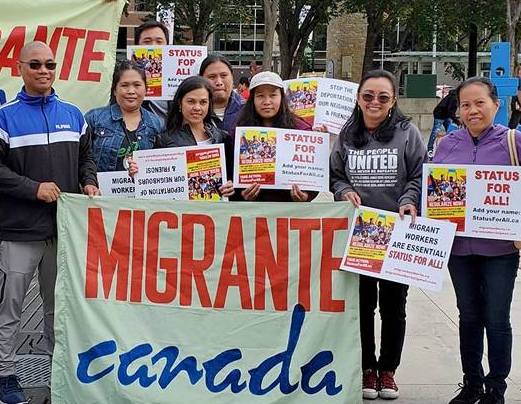 "Invisible
workers are not a burden on society, we work hard and contribute
to the
economy. We are helping the economy grow, but we are not
recognized. We
are living in the shadows, living in fear of being deported,
living in
fear of being caught going to work. But if we do not go to work,
how
can we survive?
"Invisible
workers are not a burden on society, we work hard and contribute
to the
economy. We are helping the economy grow, but we are not
recognized. We
are living in the shadows, living in fear of being deported,
living in
fear of being caught going to work. But if we do not go to work,
how
can we survive?
"We want the government to hear us. We need the support of all the organizations of the people, of the workers, in our fight for regularization.
"Our Canadian-born children are treated as second-class Canadians. When I gave birth to my daughter, I had no coverage for health care, and then my daughter did not get health care coverage. By law, any child born in Canada is supposed to have health care, and also the right to education. Mothers, parents could not get coverage for their Canadian-born children.
"So Migrante [a migrant workers support organization -- WF.] campaigned for our children to have health care, we lobbied the government. We fought for it and we won that fight.
"I have been here for a decade. My life is here, I belong here. This is my second home. I love my community, I love Canada, but I don't know why I am still struggling for my papers, my permanent residency.
"When I see the growing support, all the people standing with the undocumented workers, it makes me stronger, it makes me more confident in raising my voice. If we fight together, we can win."
Greetings from Northern BC

We are ending our report with the greetings sent by the Northern Feminist Institute for Research and Evaluation (Northern FIRE) and its electronic network -- the Women North Network! that said it all:
"Today is a day for us all to celebrate our successes, while at the same time recognizing the significant injustices that remain and substantial challenges yet to be tackled. We stand together for the rights of women and the rights of everyone in Canada and across the globe. Today some of us remember the wise words of a song from organizing in the '60s and '70s: The liberation of women is the necessary condition for the elimination of all indignities against humankind. We look forward to working with everyone in the days and weeks ahead to continue our collective work."
International Women's Day
Celebrated
Across the Country
 Montreal, March 8, 2023
Montreal, March 8, 2023
On
the occasion of International Women's Day across Canada and
Quebec
women organized rallies, marches and gatherings of all kinds to
advance
their struggle for their rights and the rights of all.
Montreal
More than 250 women and girls
marched through the streets of Montreal on March 8, representing
women’s and social organizations. At the offices of the
Premier, the federal government and the U.S. Consulate they
expressed
their determination to resist attacks on their rights and their
solidarity with the fighting women of the world.
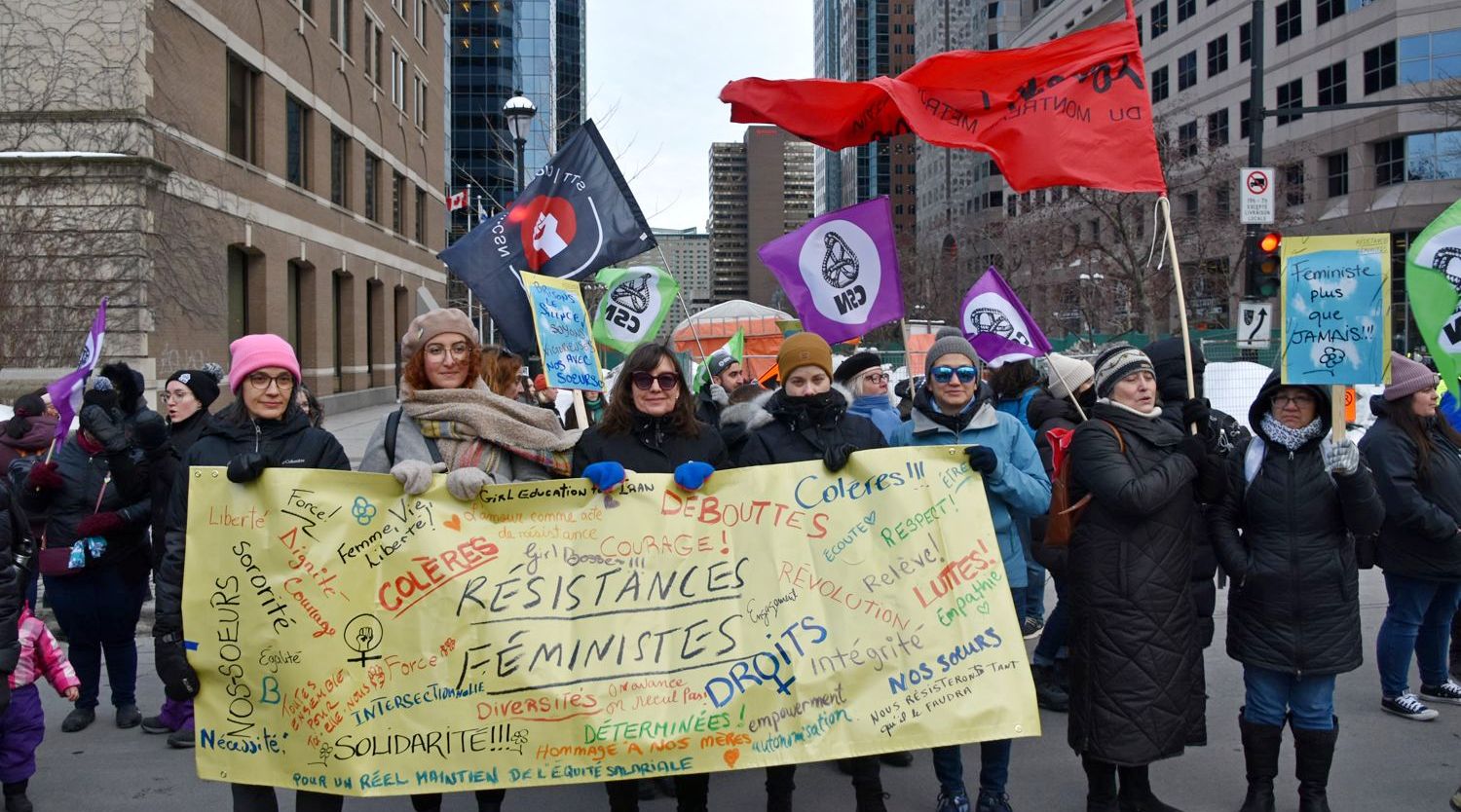
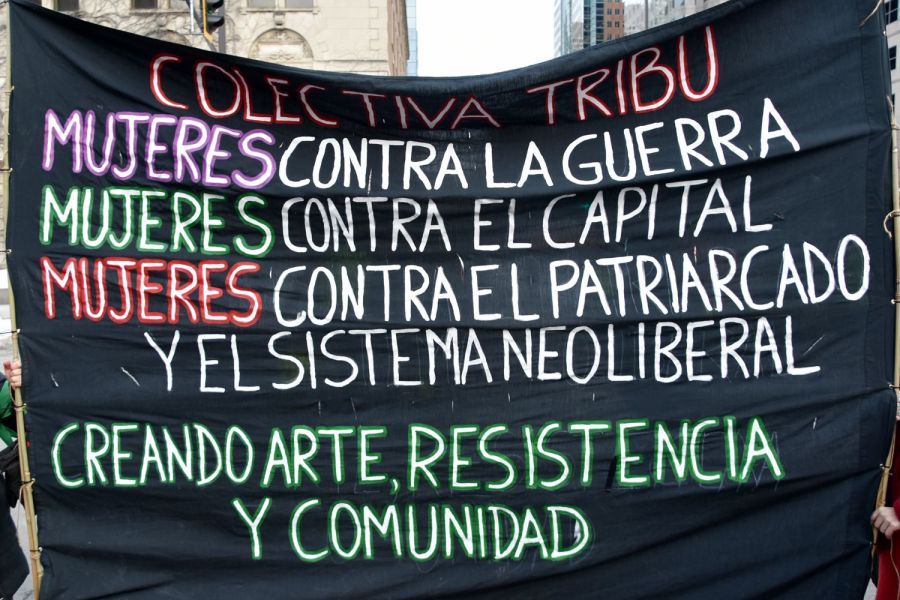
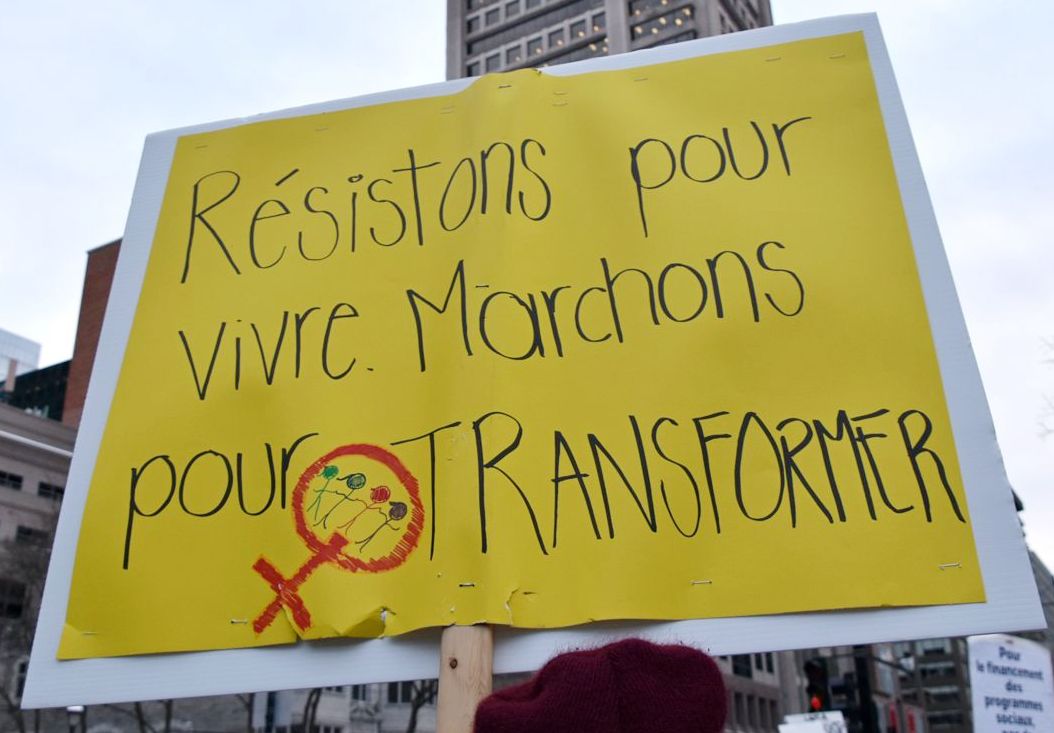


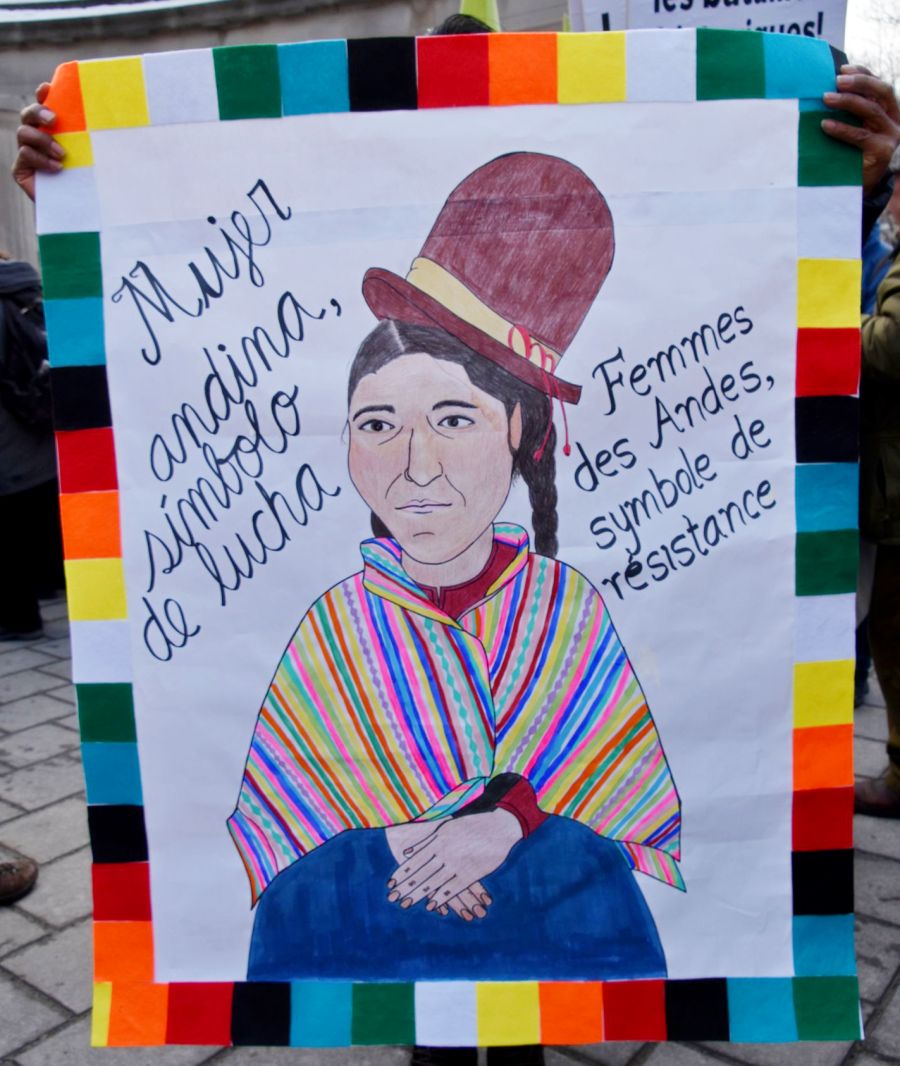
Toronto
The Toronto International Women's Day Committee together with Women Working with Immigrant Women organized a lively meeting in Toronto on March 4. Education and health care workers, migrant workers and youth spoke about their work and their demands. The rally ended with spirited drumming by the Eagle Women Singers and a skit by the South Asian Women’s Rights Organization. After the meeting hundreds marched through the downtown streets to Toronto Metropolitan University.
Scarborough
On
March 19, the South Asian Women's Rights Organization (SAWRO)
organized
an International Women's Day forum
featuring songs, skits, and panel and roundtable discussions.
The
topics for discussion covered issues that have been identified
as
important through SAWRO's work, from housing, childcare and
health
care to rights in the workplace and how to make advances
in
fighting for needed changes in those areas.
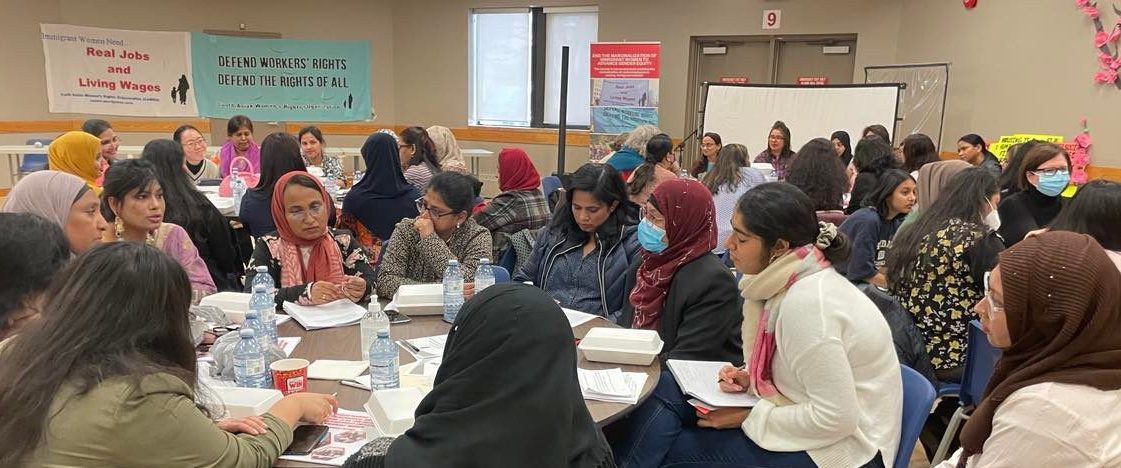
Windsor
On March 8 a spirited rally was held at the picket line of Windsor Salt workers in support of their fight for the right to bargain their working conditions and defend their jobs and safety against contracting out. Participants denounced the role of a U.S. union-busting law firm to break the workers' resistance.
Winnipeg
In Winnipeg a healing walk was organized by the
Clan Mothers healing village to celebrate and honour all women
on the
occasion of International Women's Day.
Edmonton
Women for Rights and Empowerment (W4RE) organized a lively and militant march on March 5 which followed a celebration that included Indigenous youth performing the Grandmother song, Filipino youth leading the One Million Women Rising dance, and a dance honouring the struggle of the Peruvian women and people.
On March 8, Women for Rights and Empowerment held a very successful dinner and discussion, with around 135 women and their families participating. Women from many sectors of the economy took part, among them a large contingent of migrant workers; along with Indigenous women leading the fight for justice for murdered and missing women, Palestinian women leading the fight for the right to be, women active for climate justice and water is life, those in advocacy for incarcerated women, and others and spoke about their concerns and the fights they are waging, including a representative of the Communist Party of Canada (Marxist-Leninist). What stood out from the discussion was that successes are achieved when we fight together, and the strong sense of responsibility for each other, and the need to continue the discussion throughout the year.
Calgary
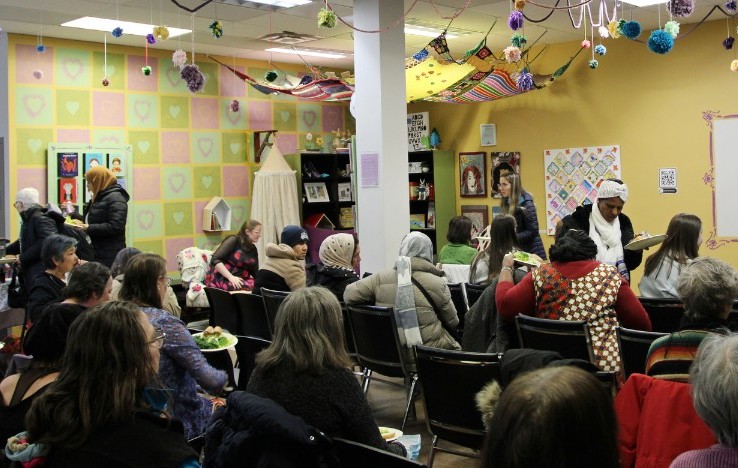
(Photos: TML, EYN, IWD Toronto, Clan Mothers, Calgary Women's Centre)
Women's Memorial Marches Honour Missing and Murdered Indigenous Women and Girls
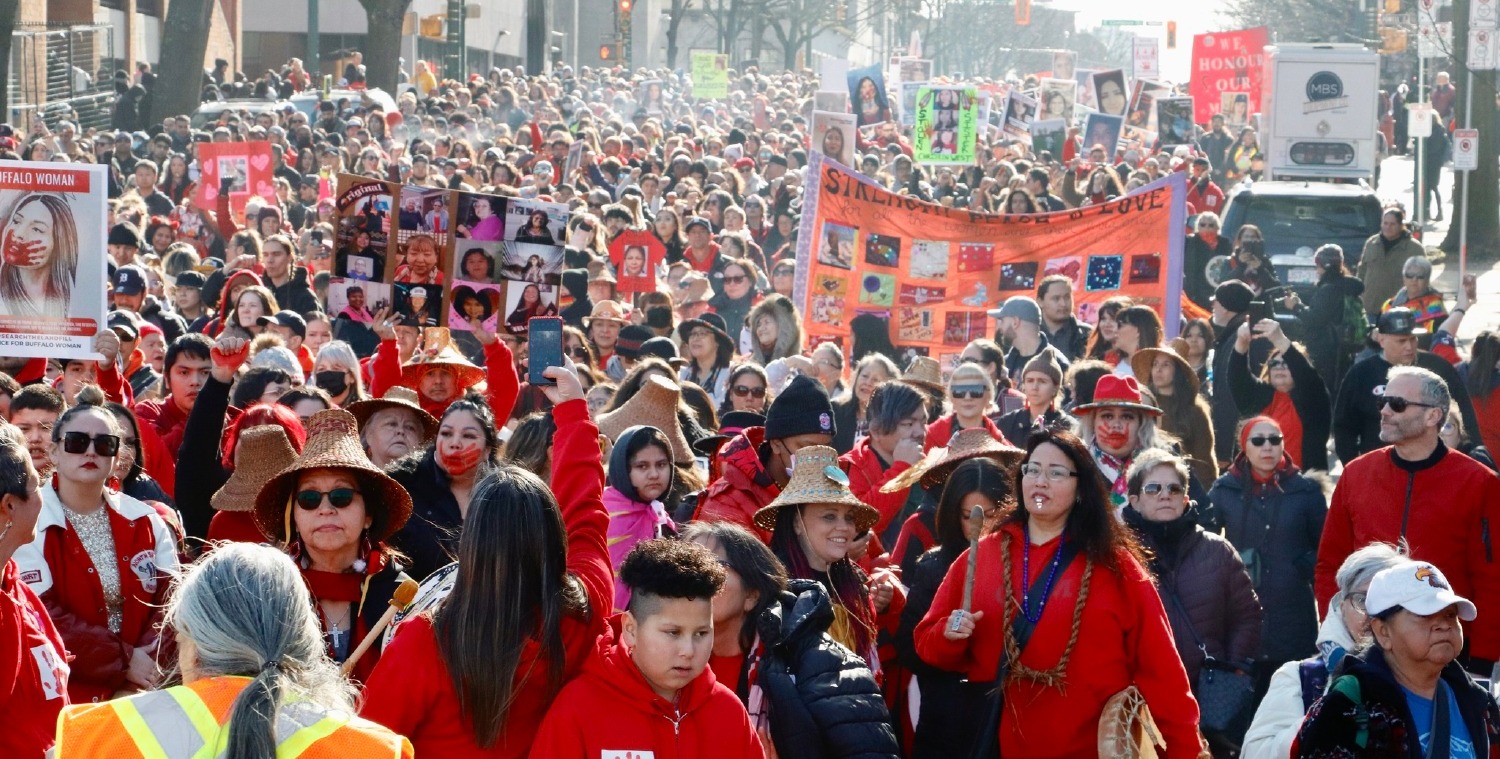
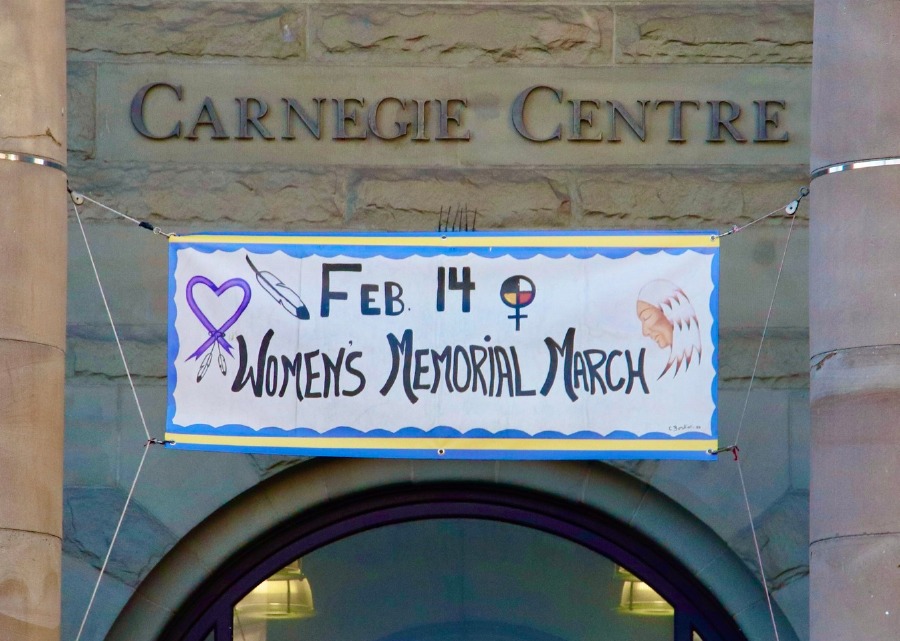 Thousands of
people participated in the 32nd Women's Memorial March in
Vancouver on
February 14 organized by the friends and families of missing and
murdered Indigenous women and girls in the Downtown Eastside
neighbourhood of Vancouver. The march was joined by the families
of
women from other parts of BC and from across the country. The
march
honours the lives of those murdered or missing and demands
justice and
an end to state-organized violence against Indigenous Peoples.
The
march wended its way through the streets of the Downtown
Eastside
stopping in many locations where women had last been seen or had
been
found murdered.
Thousands of
people participated in the 32nd Women's Memorial March in
Vancouver on
February 14 organized by the friends and families of missing and
murdered Indigenous women and girls in the Downtown Eastside
neighbourhood of Vancouver. The march was joined by the families
of
women from other parts of BC and from across the country. The
march
honours the lives of those murdered or missing and demands
justice and
an end to state-organized violence against Indigenous Peoples.
The
march wended its way through the streets of the Downtown
Eastside
stopping in many locations where women had last been seen or had
been
found murdered.
Marches took place in a number of other cities and towns across the country, including Victoria, Terrace, Lethbridge, Calgary, Edmonton, Winnipeg, Thunder Bay, Hamilton, Toronto and Montreal.
The staggering number of women and girls who have gone missing and been murdered just since the marches began -- 970 in this area alone as of 2019 and many more than 4,000 across the country -- is a damning indictment of the refusal of the federal government and authorities at all levels to take action.
This refusal stems from the genocidal aims that have imbued the official colonial policy towards Indigenous Peoples since the creation of Canada, in which Indigenous women in particular are considered easy prey. The Canadian people demand that action be taken to end these crimes and Canada must redress them and uphold nation-to-nation relations with the Indigenous Peoples.
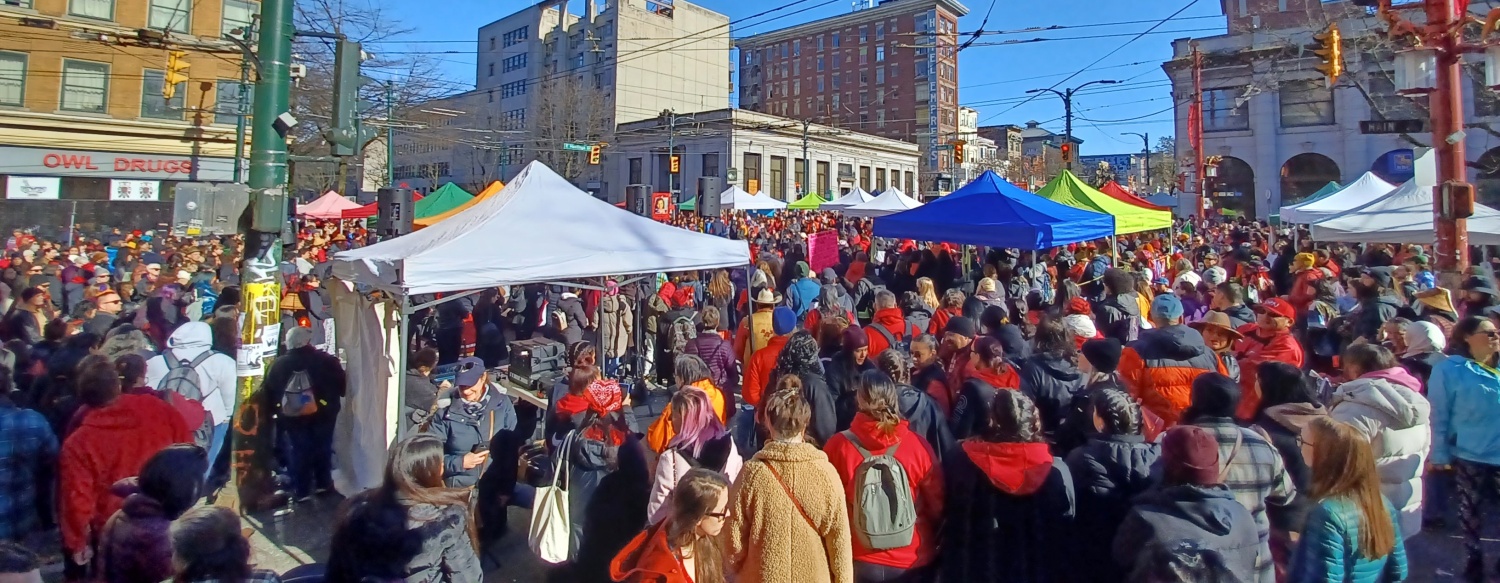
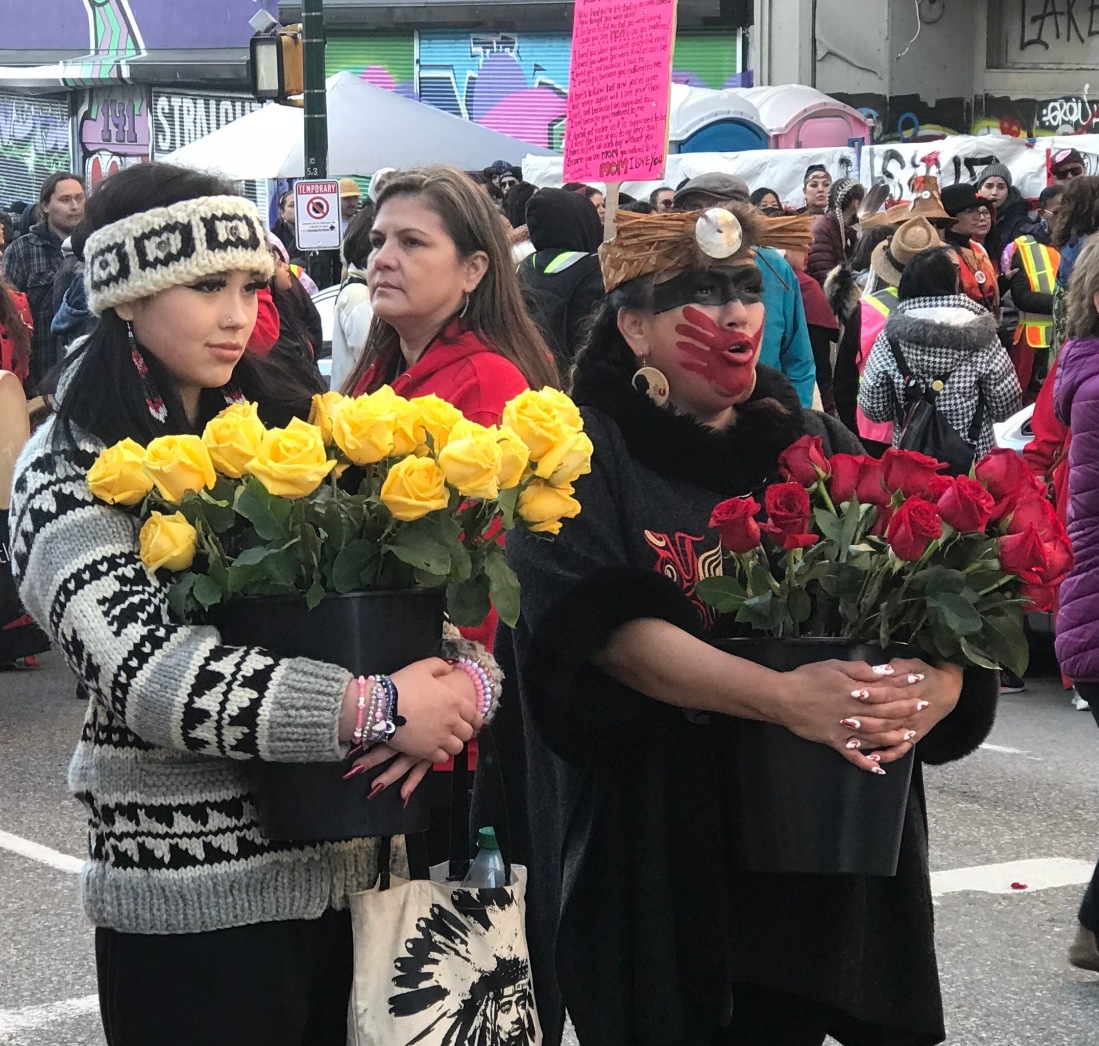
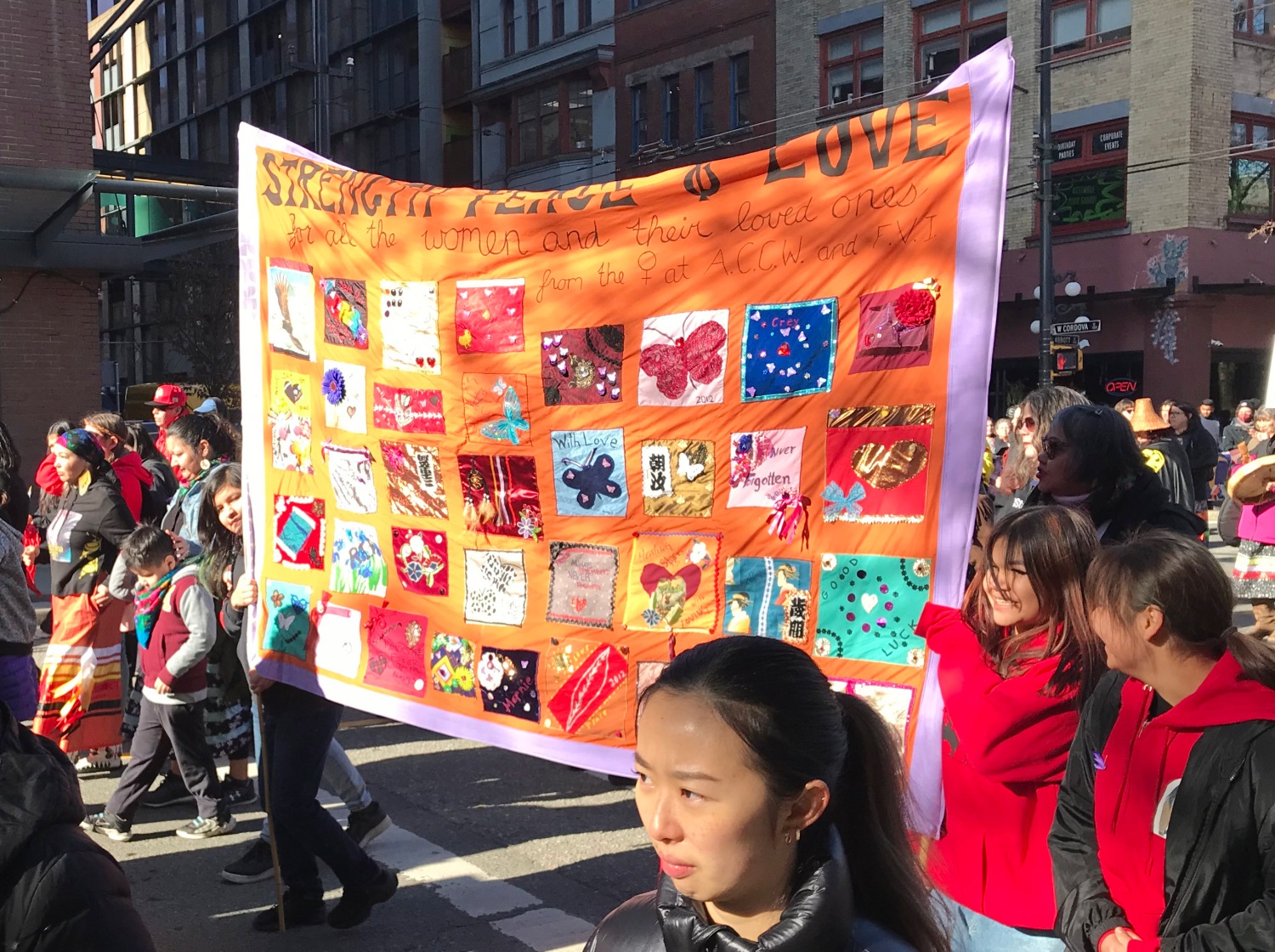
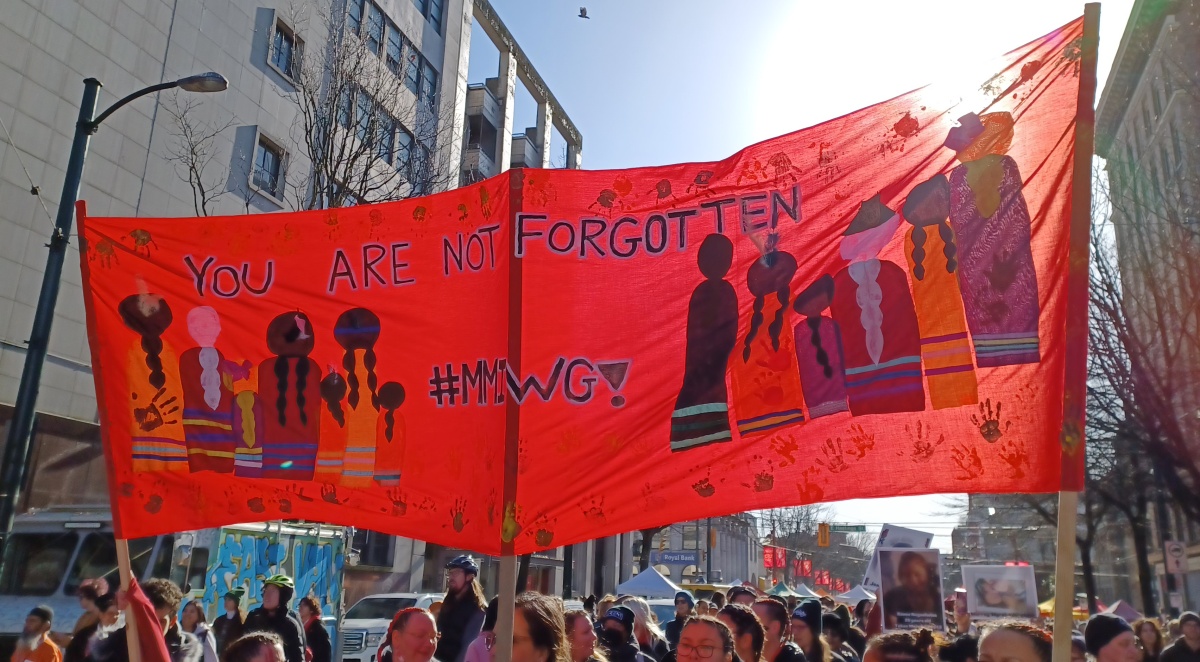
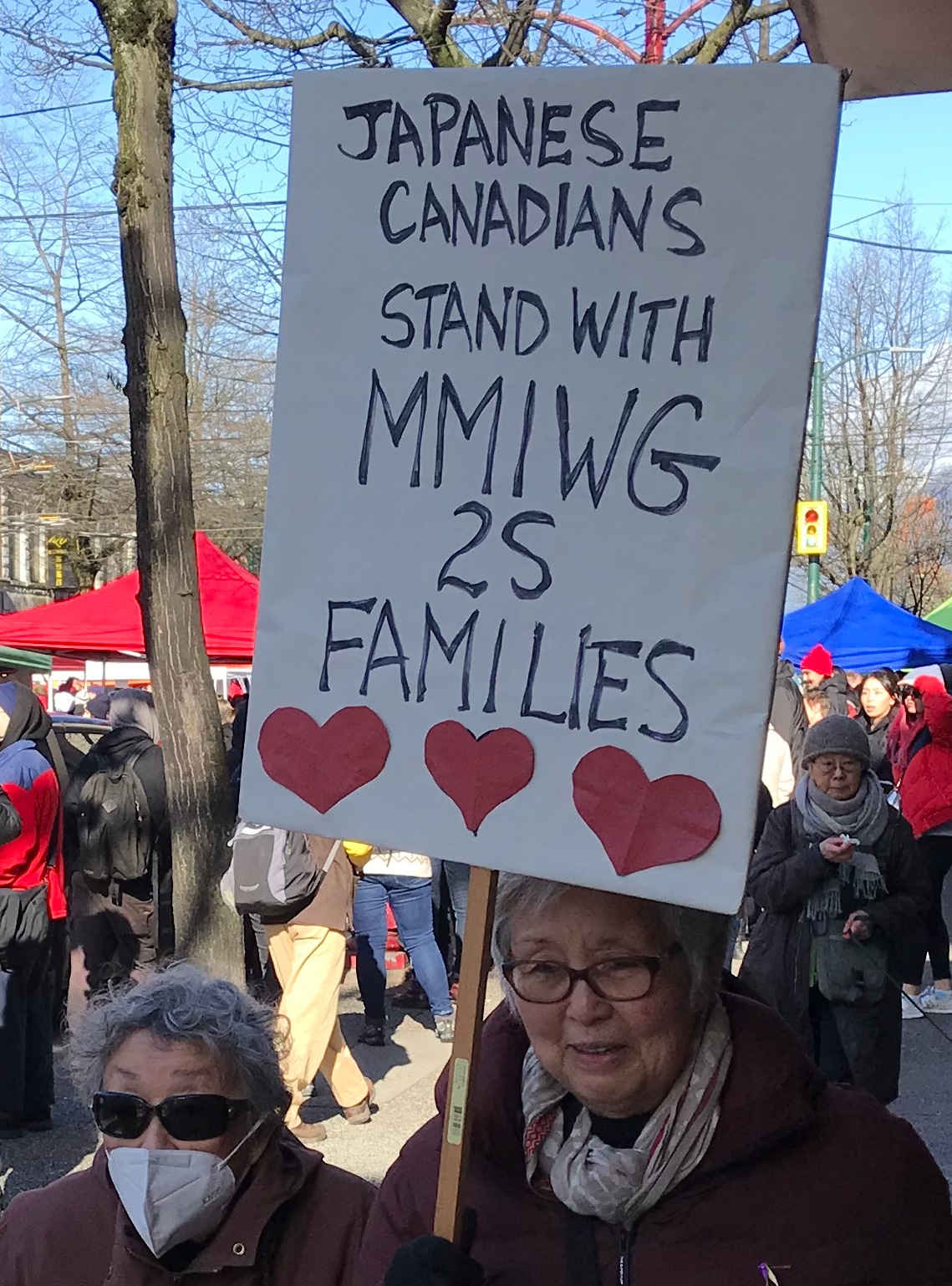

Prince George
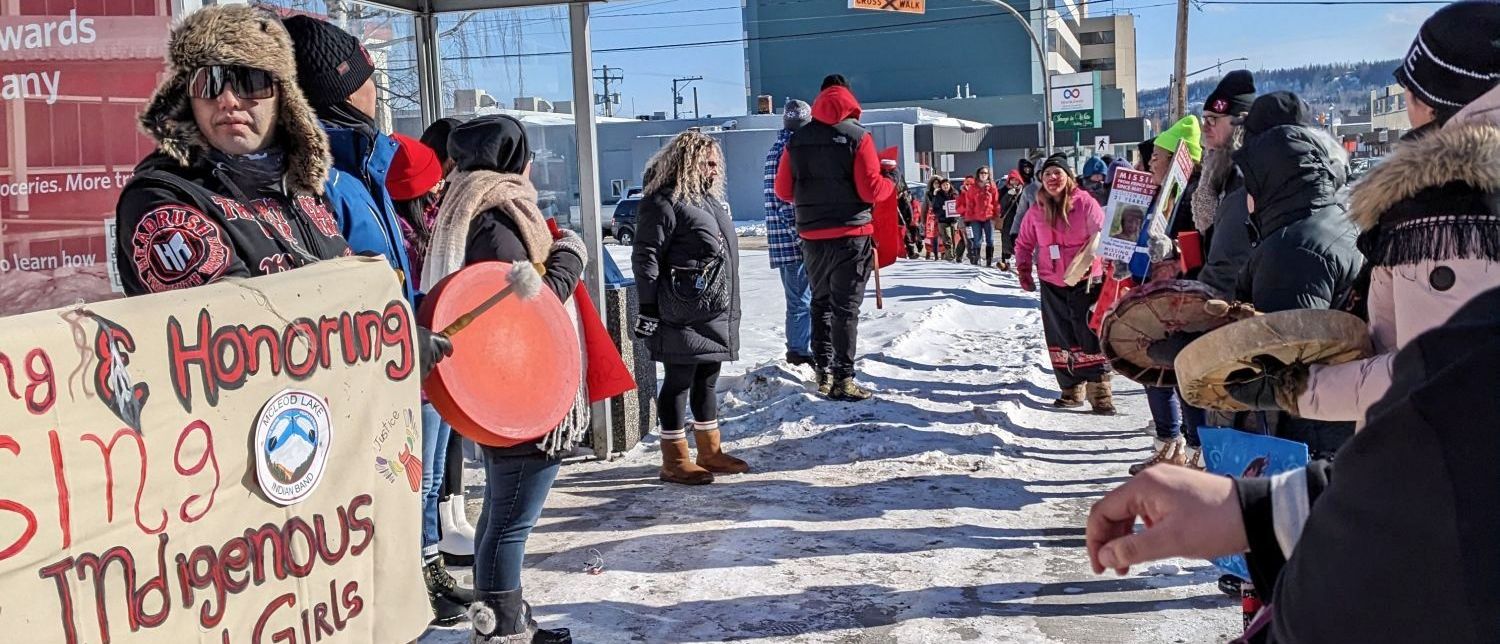
Edmonton
Winnipeg
Thunder Bay
Hamilton
Toronto
Montreal


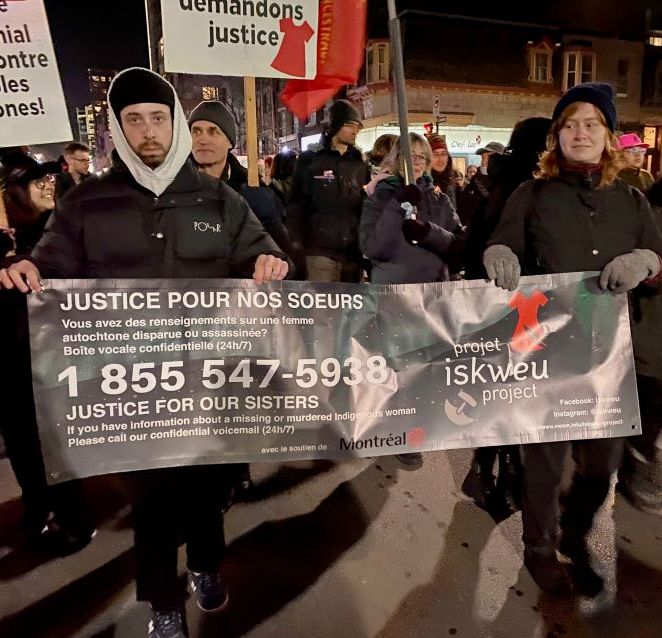

(Photos: TML, F. Jaffer, Exchange Inner City, A. Velaquez, Memorial March of Edmonton, Southern Chiefs Organization, L. Moctby, C.M. Smolenaars)
(To access articles individually click on the black headline.)
Website: www.cpcml.ca Email: editor@cpcml.ca



